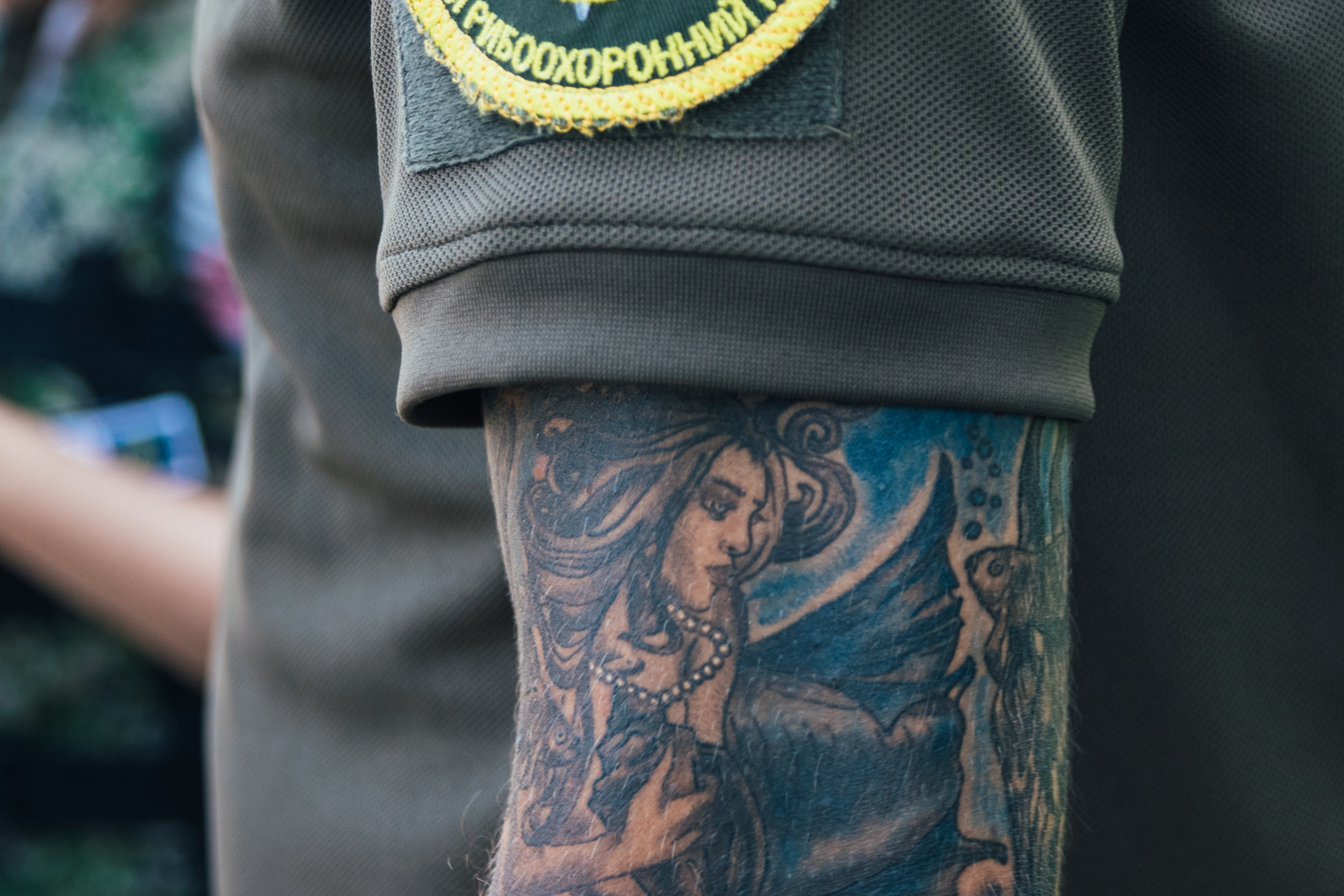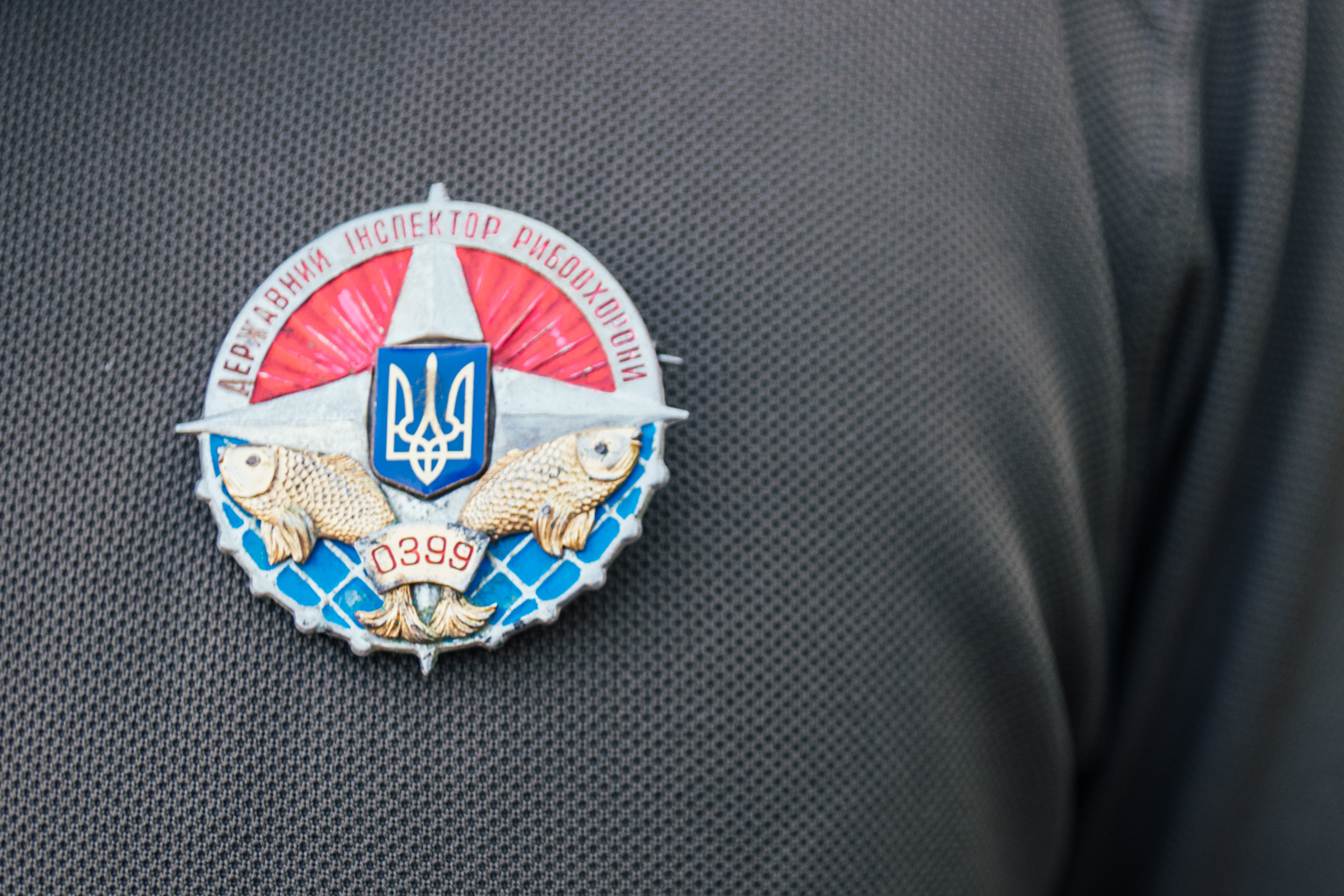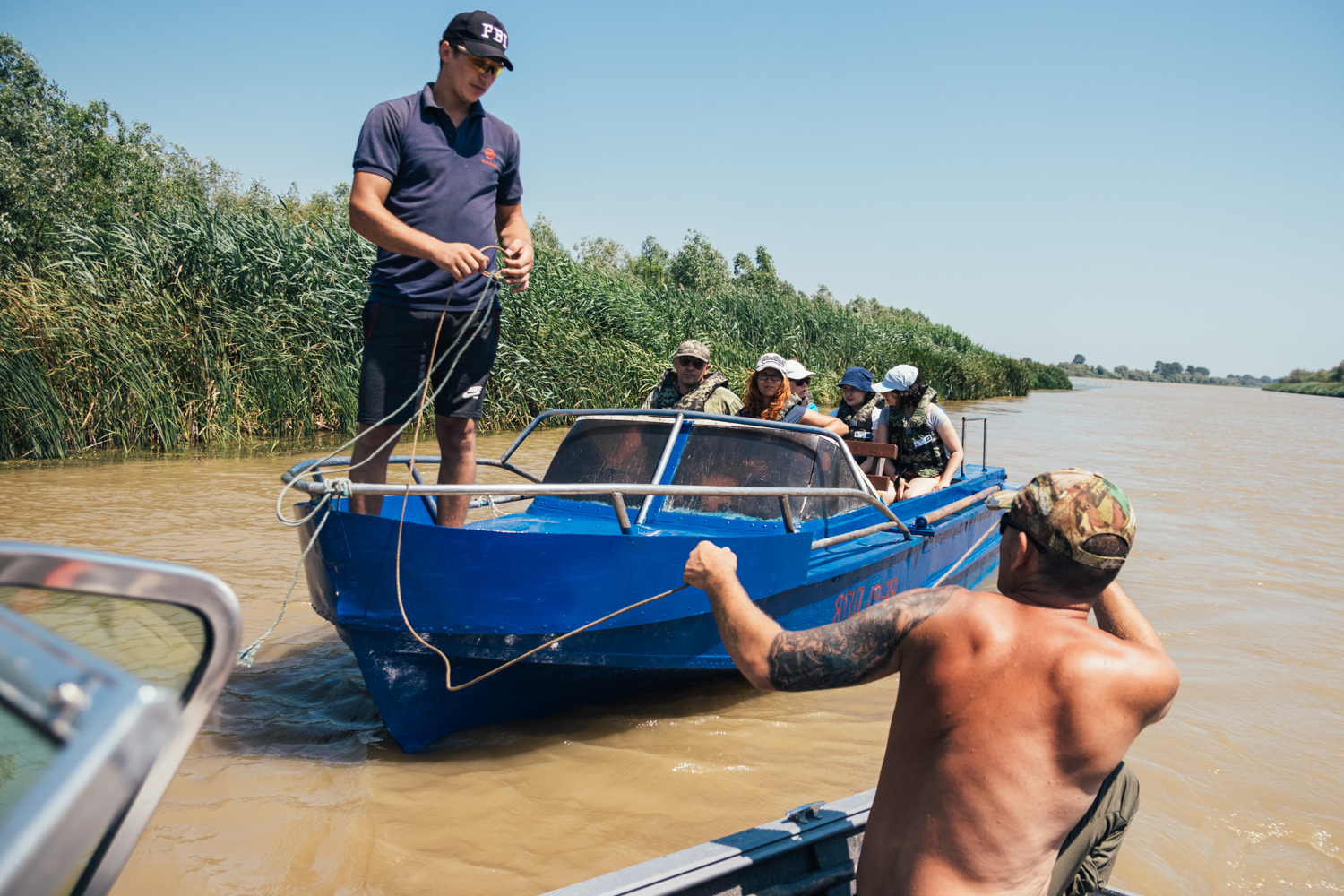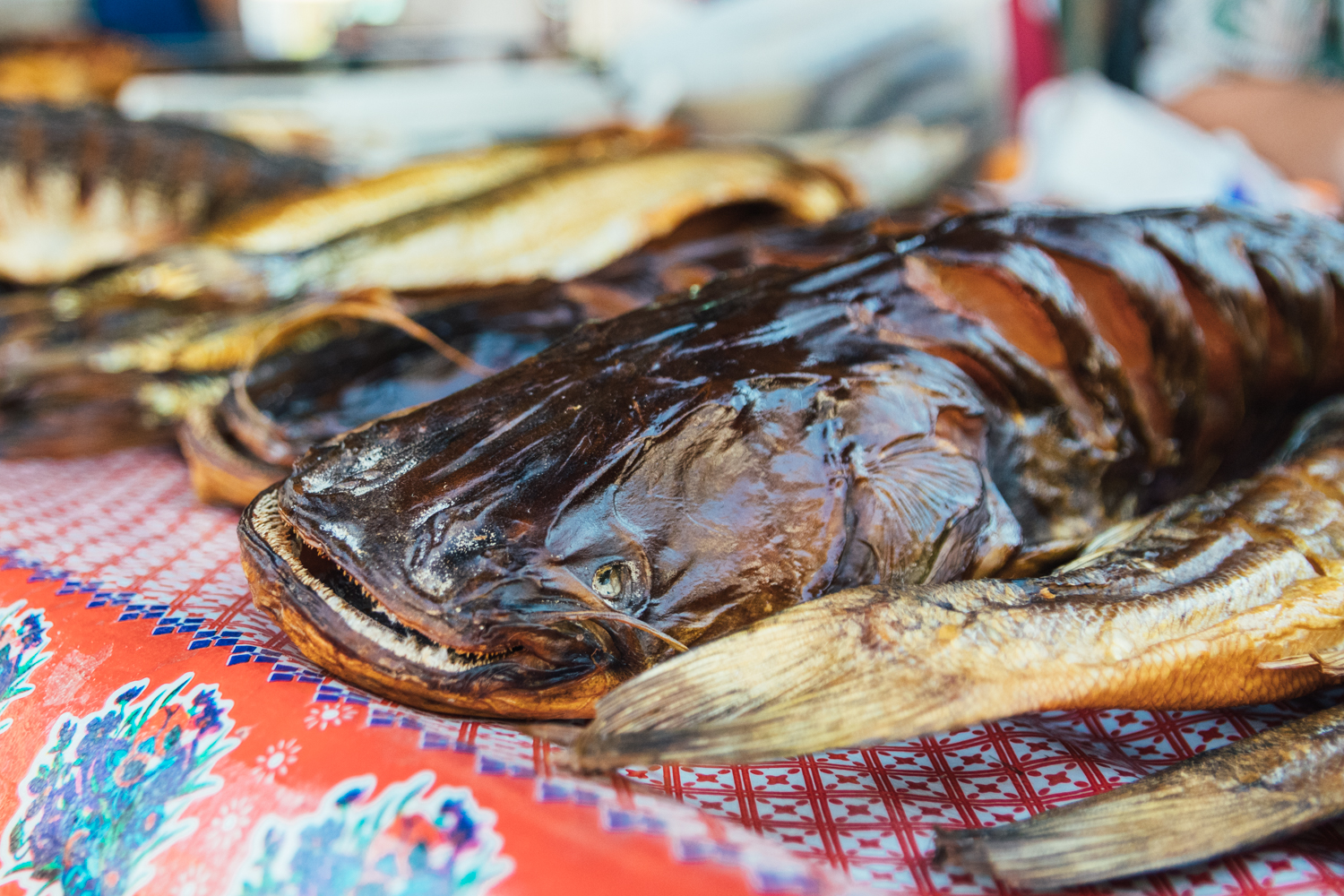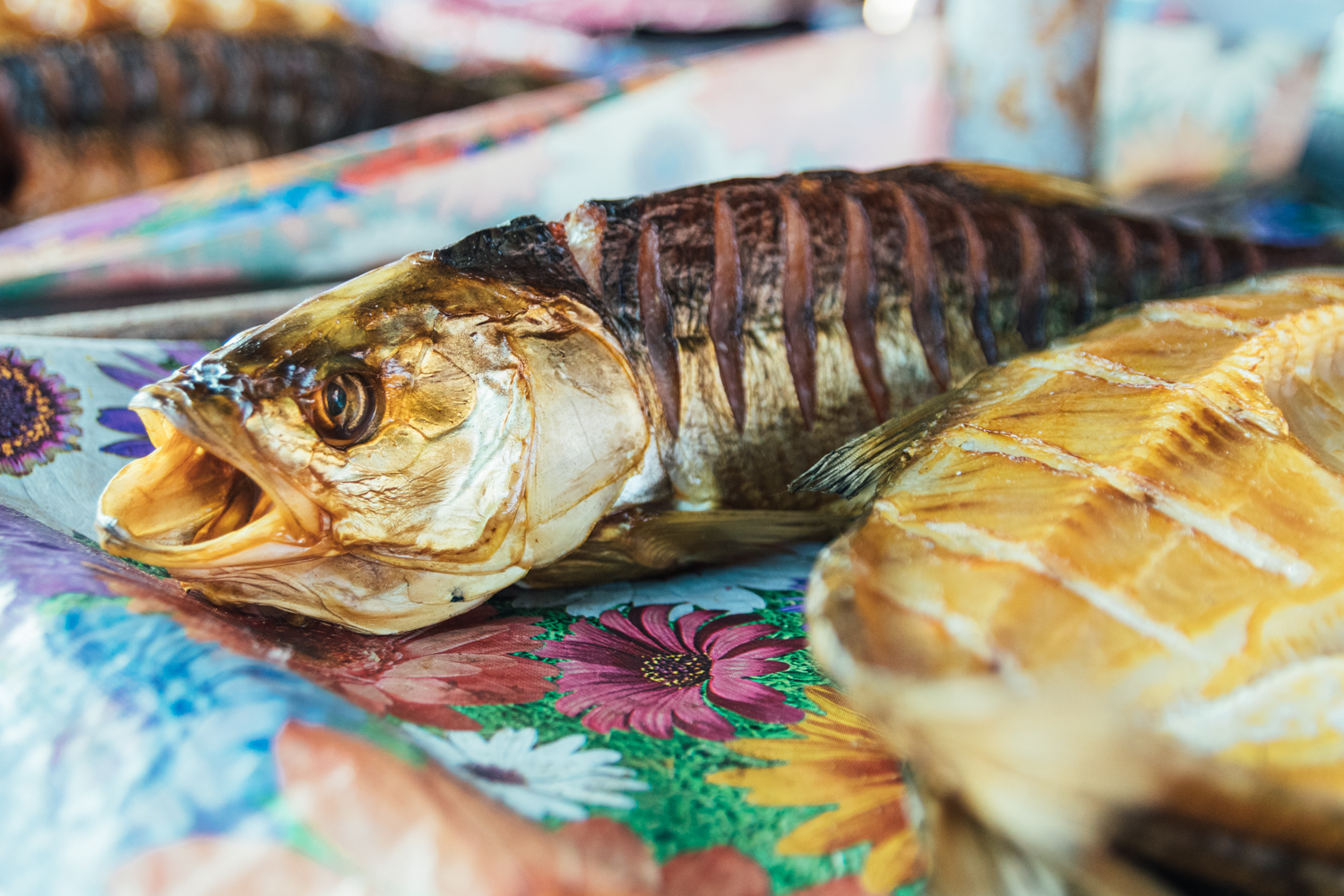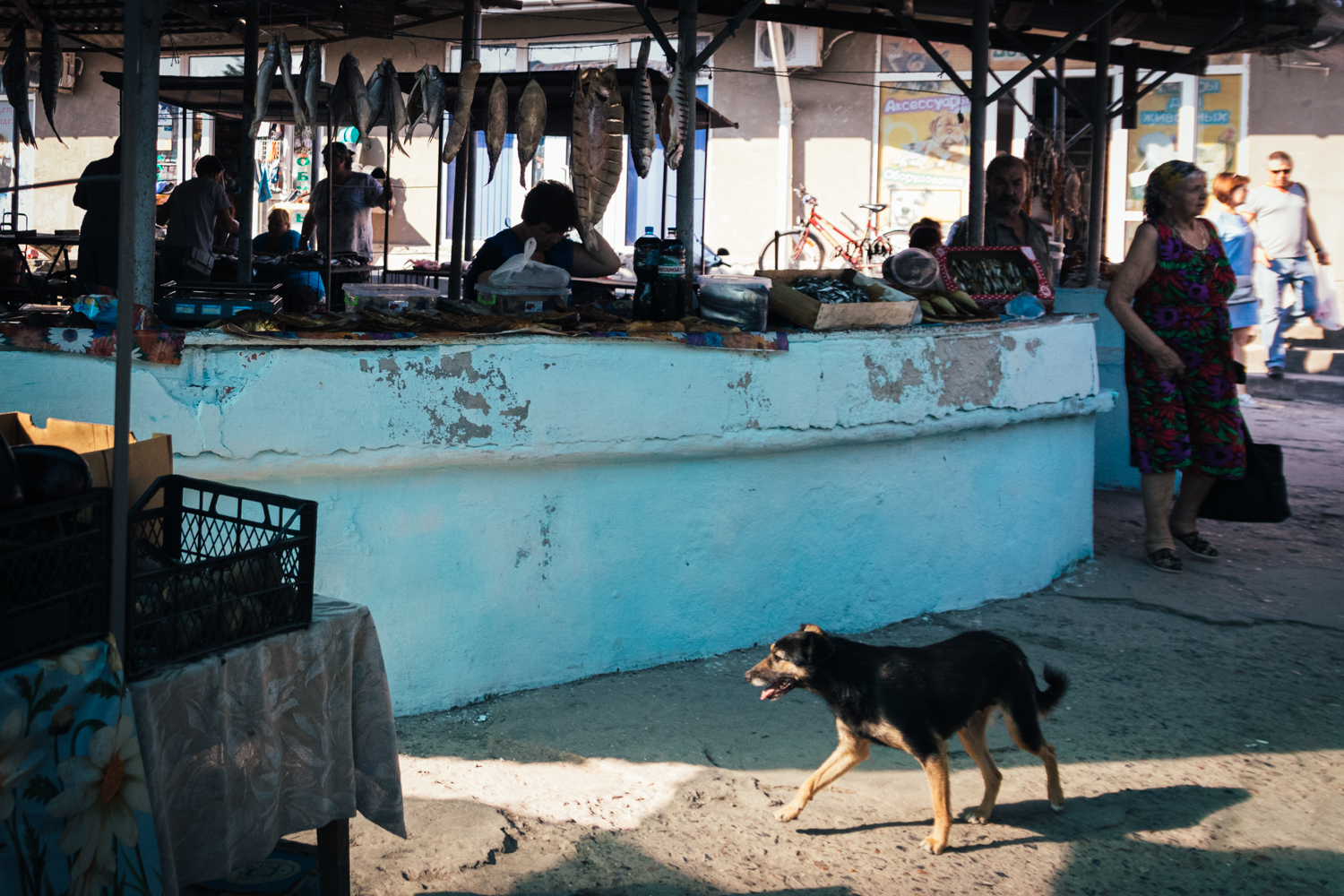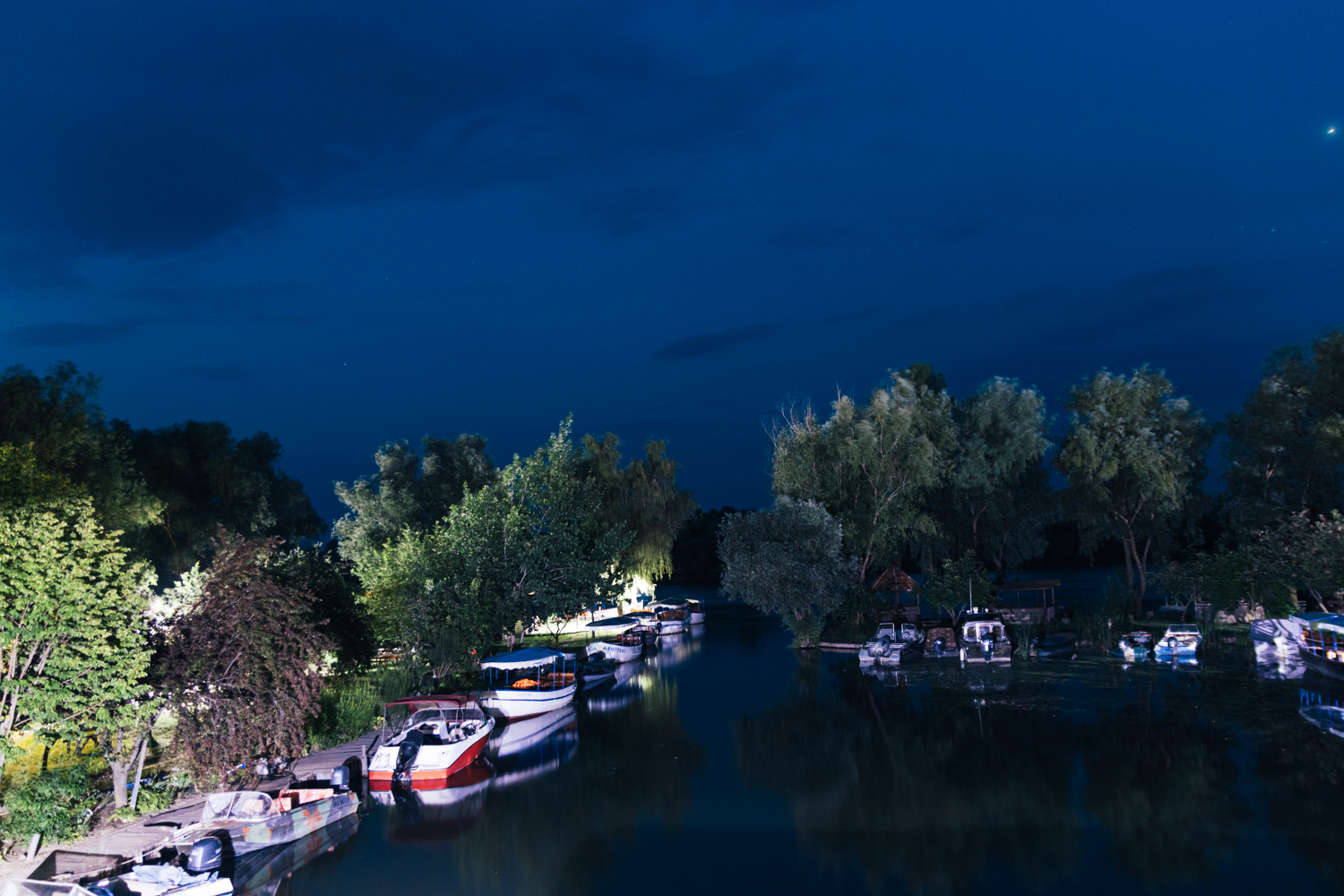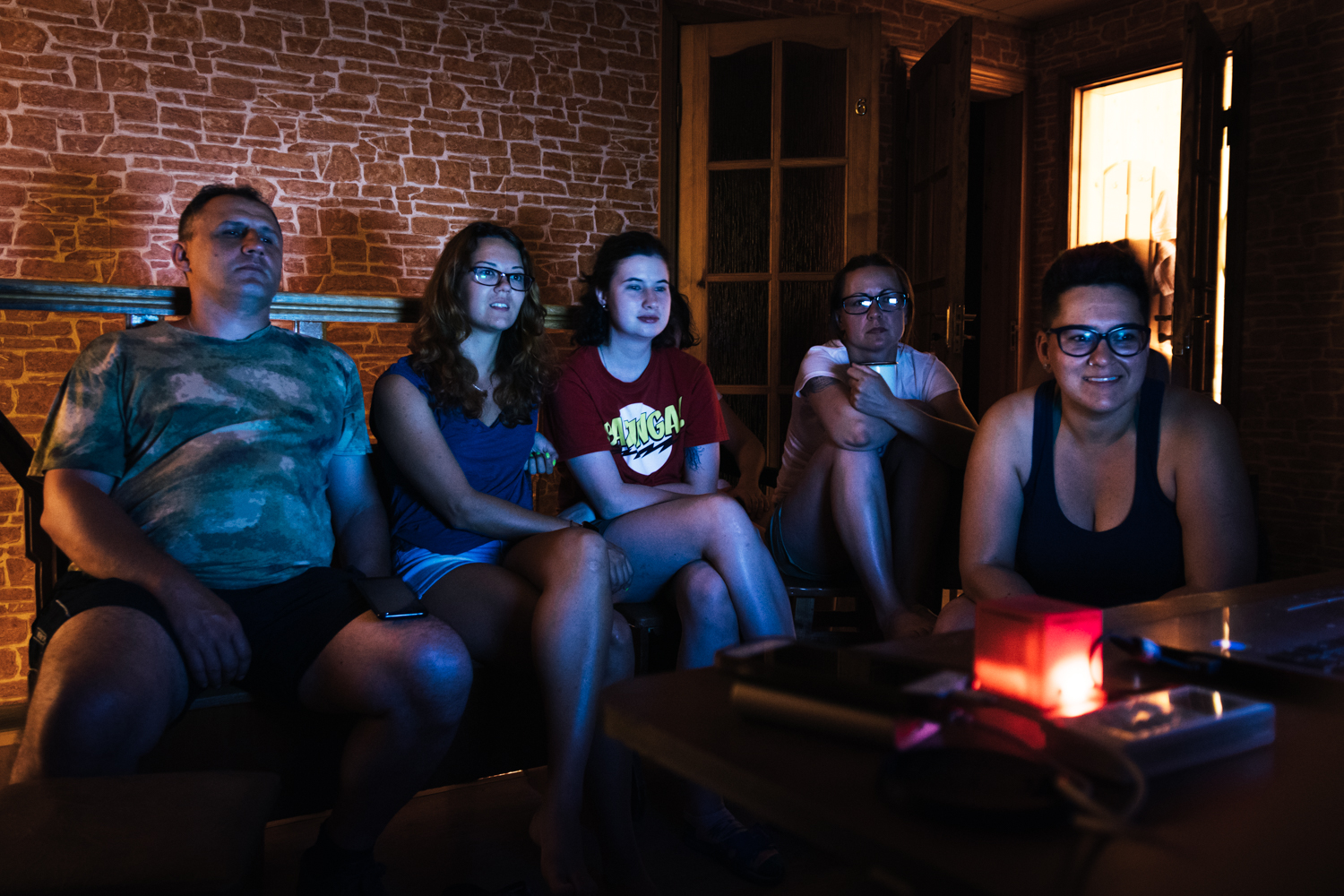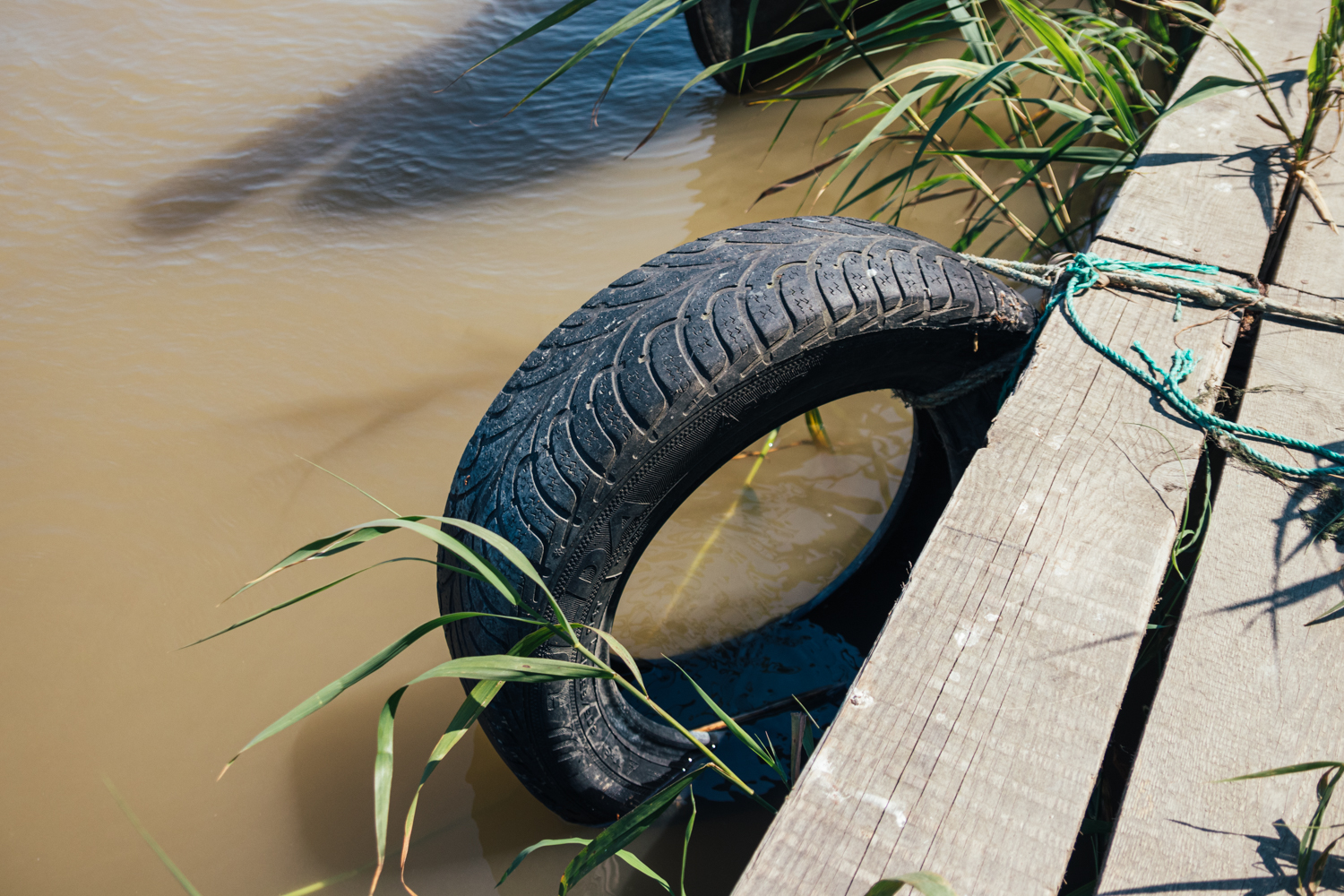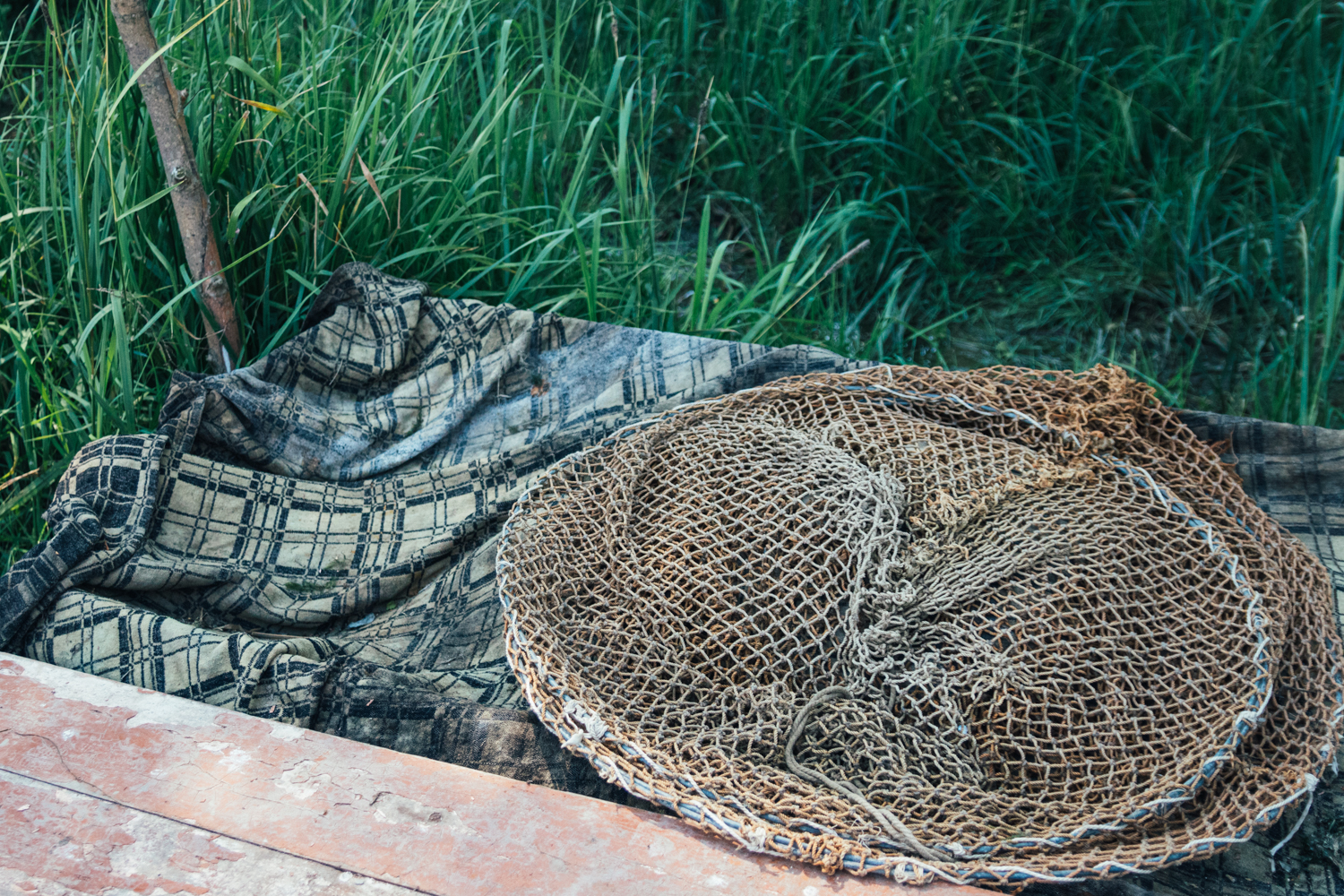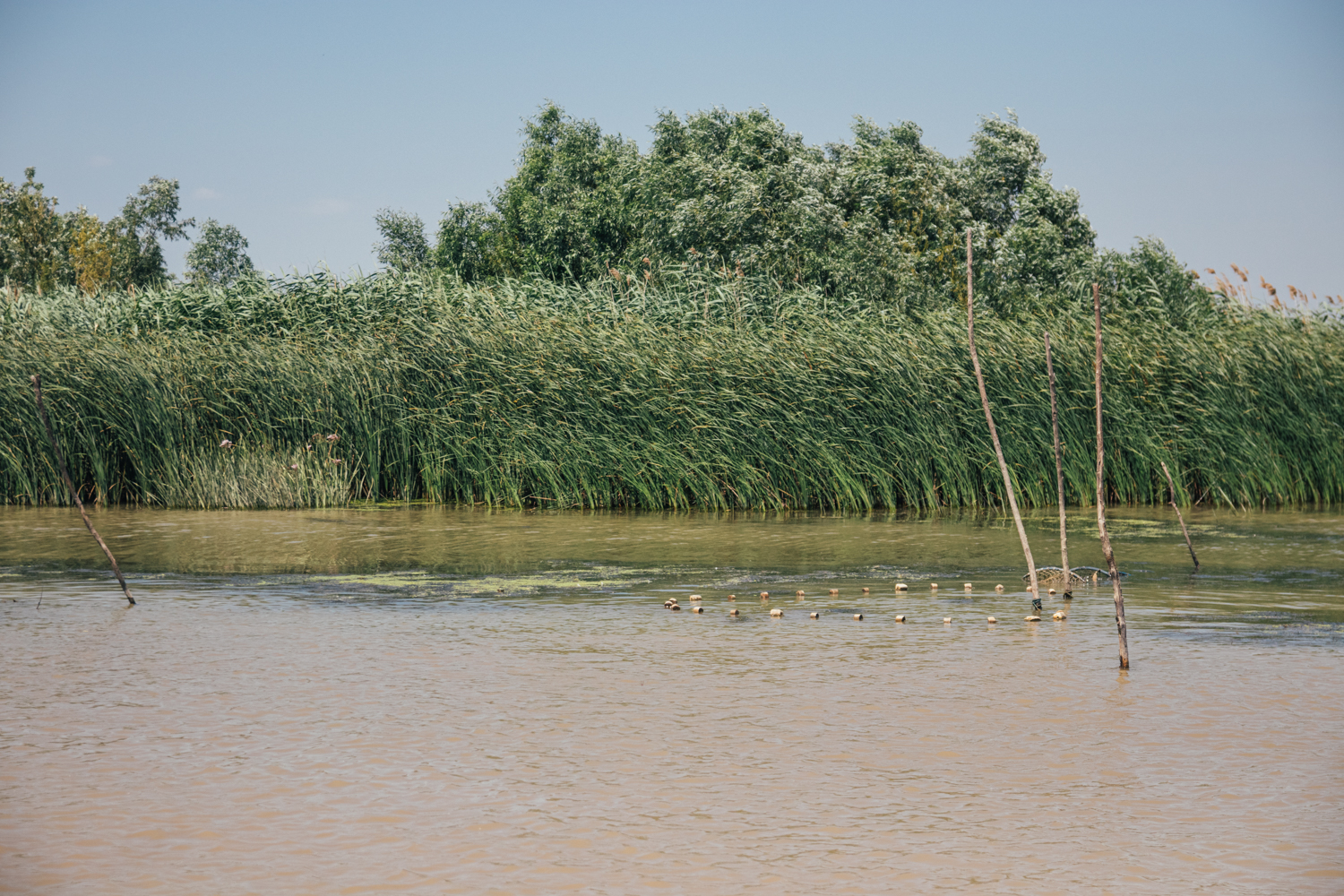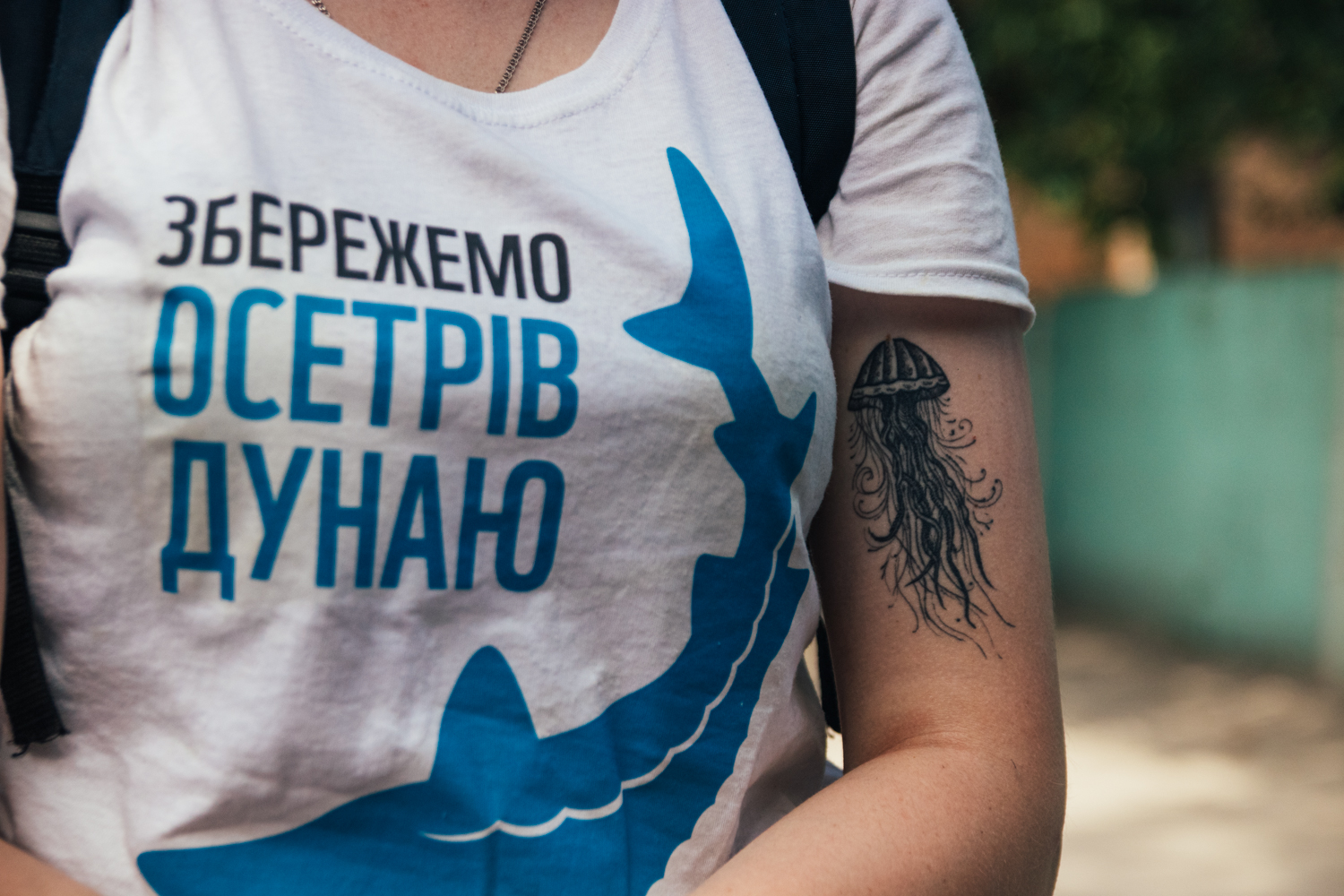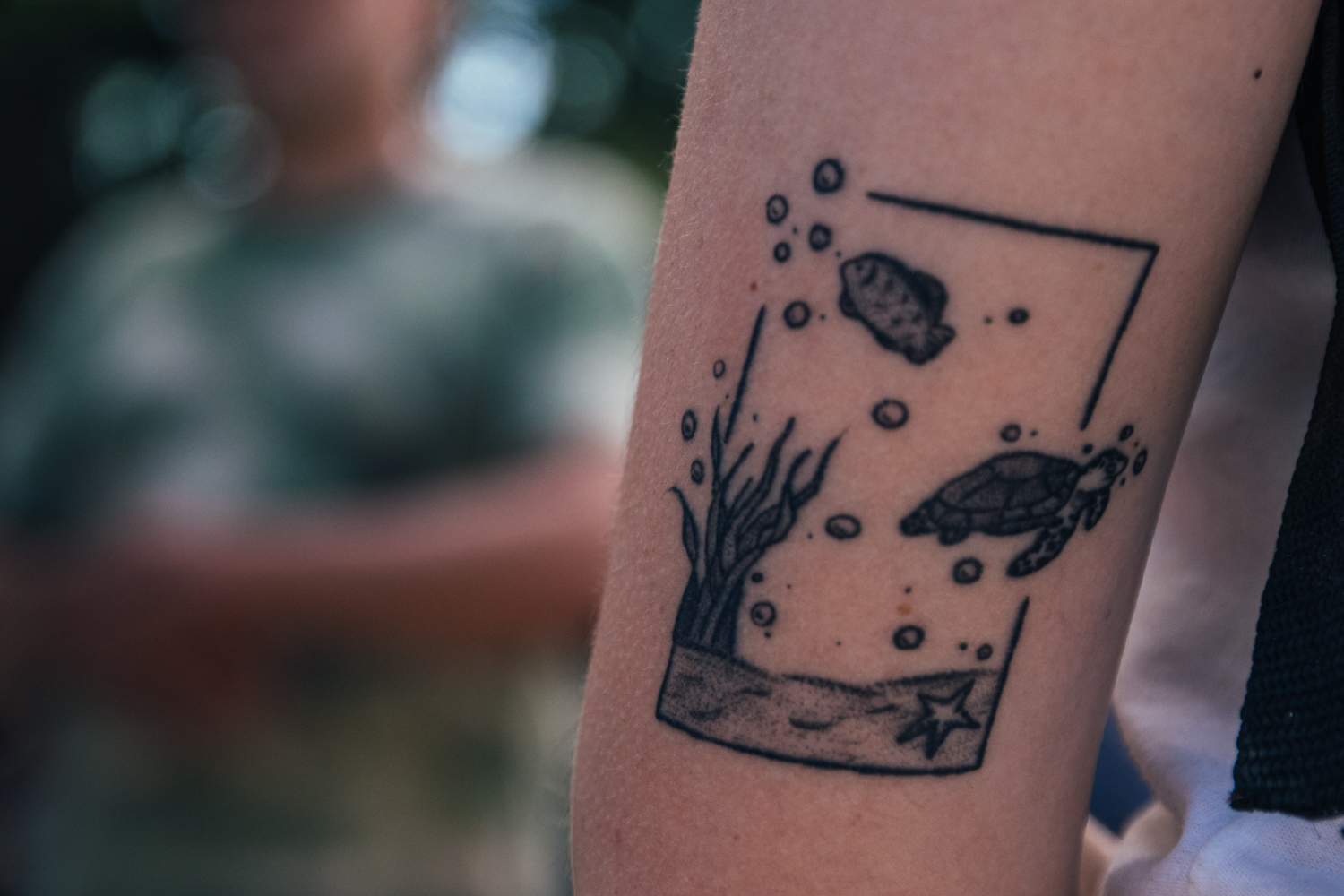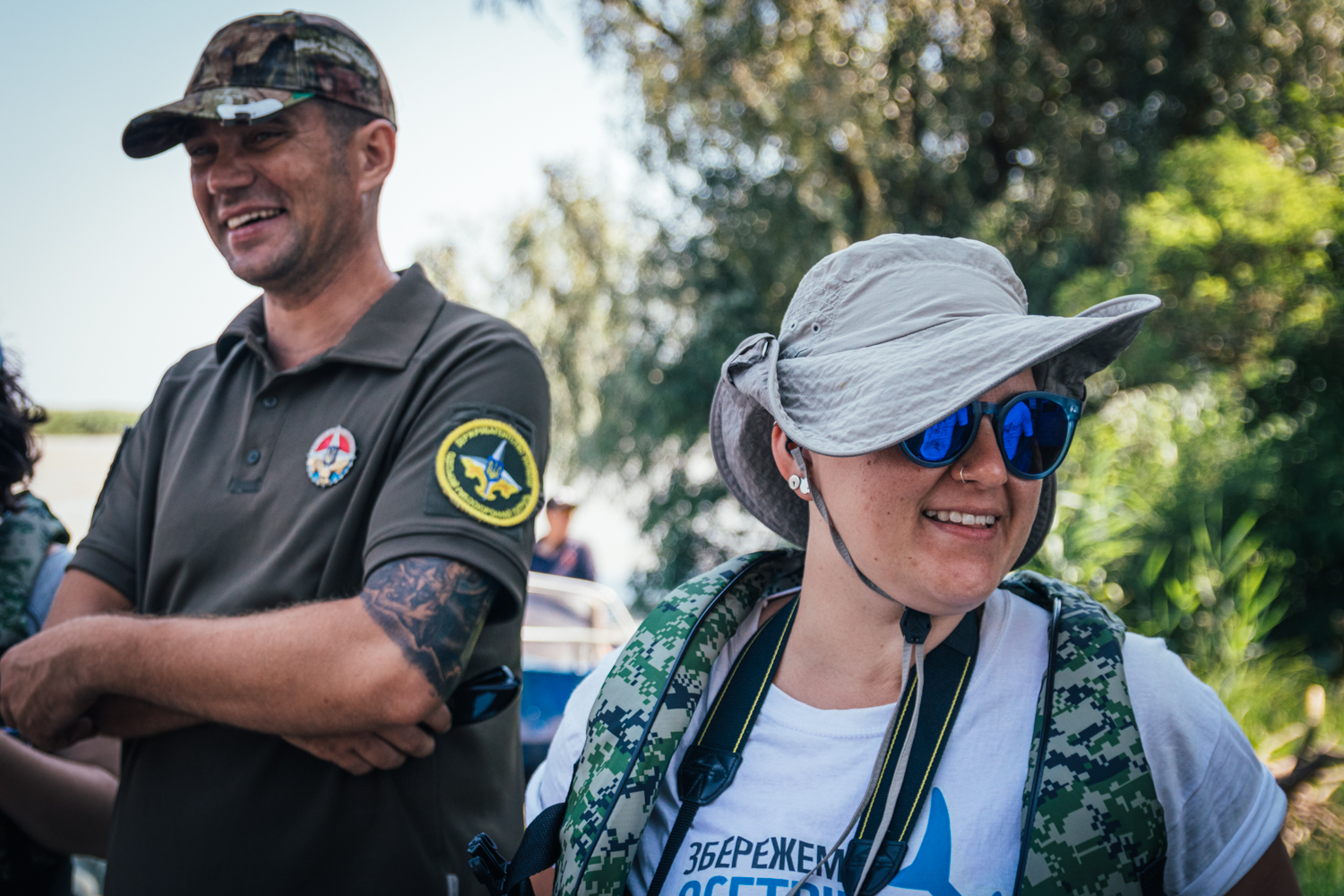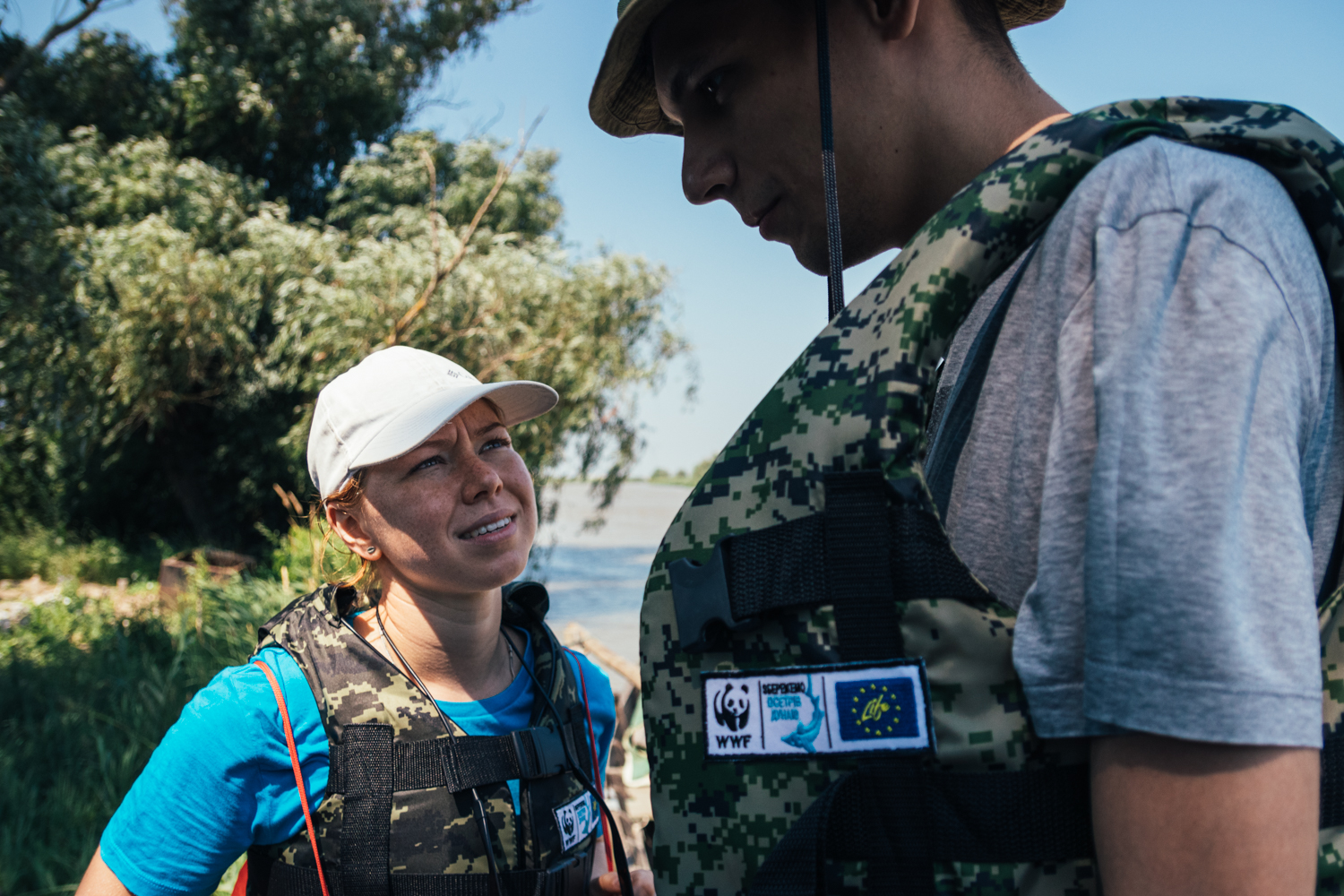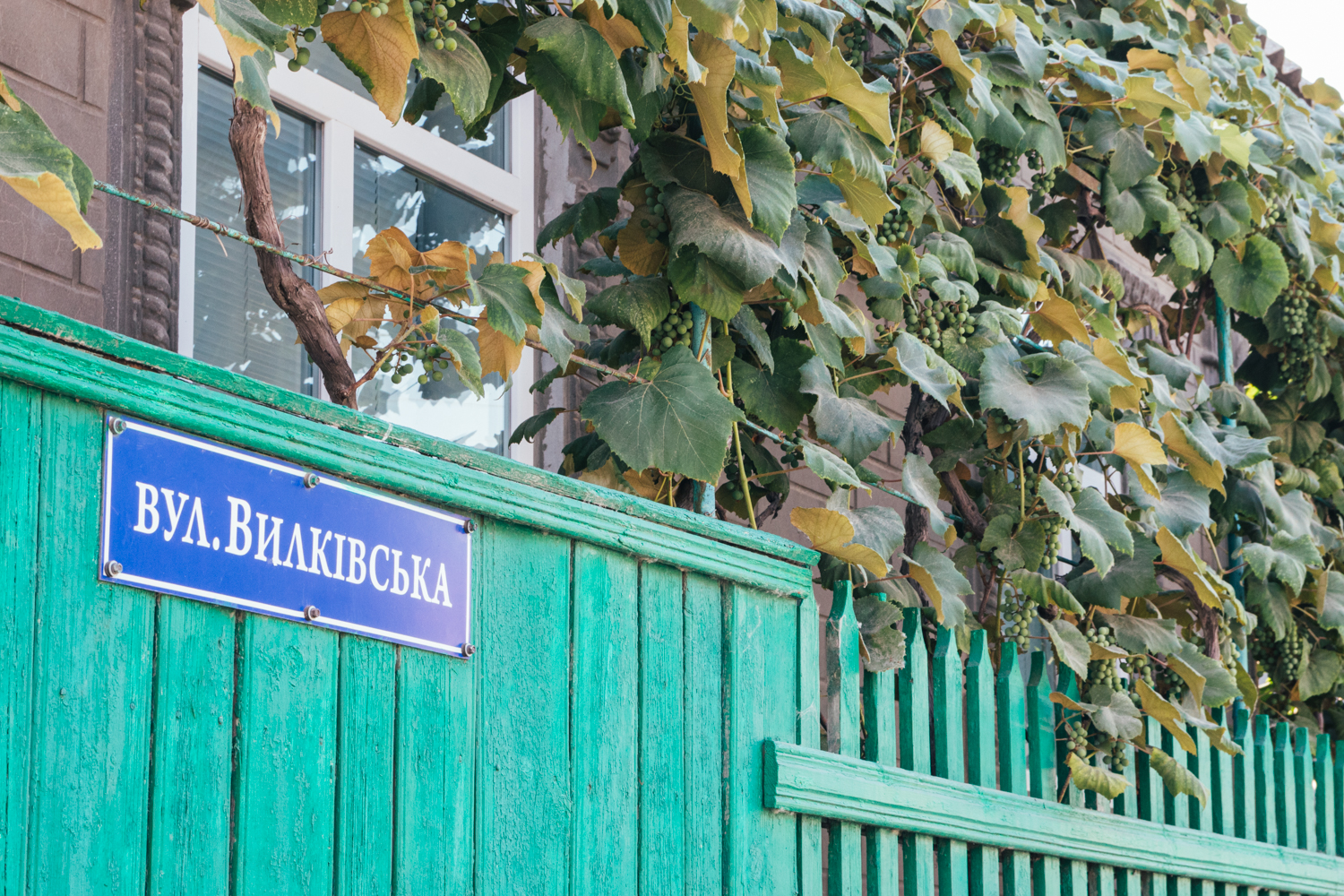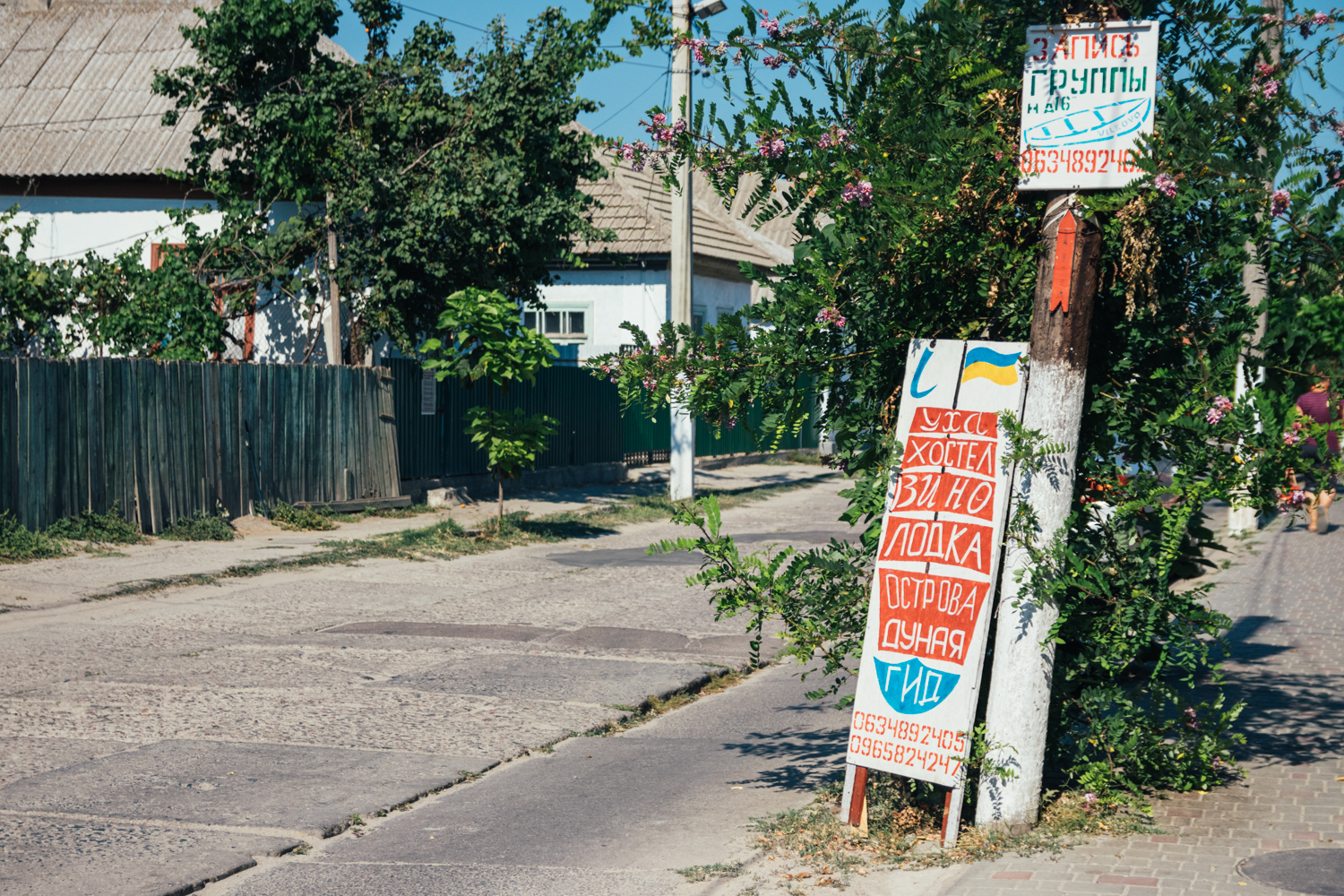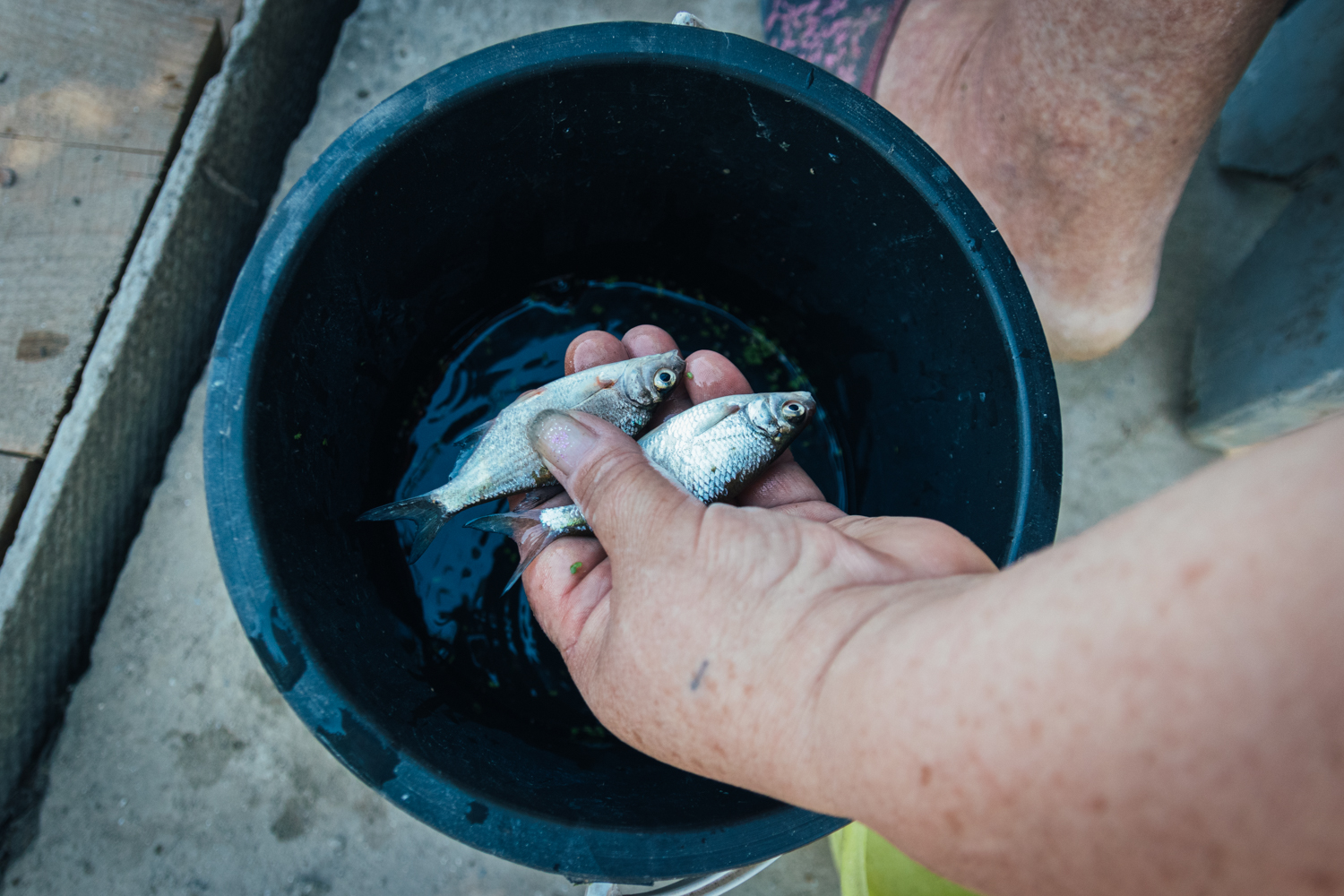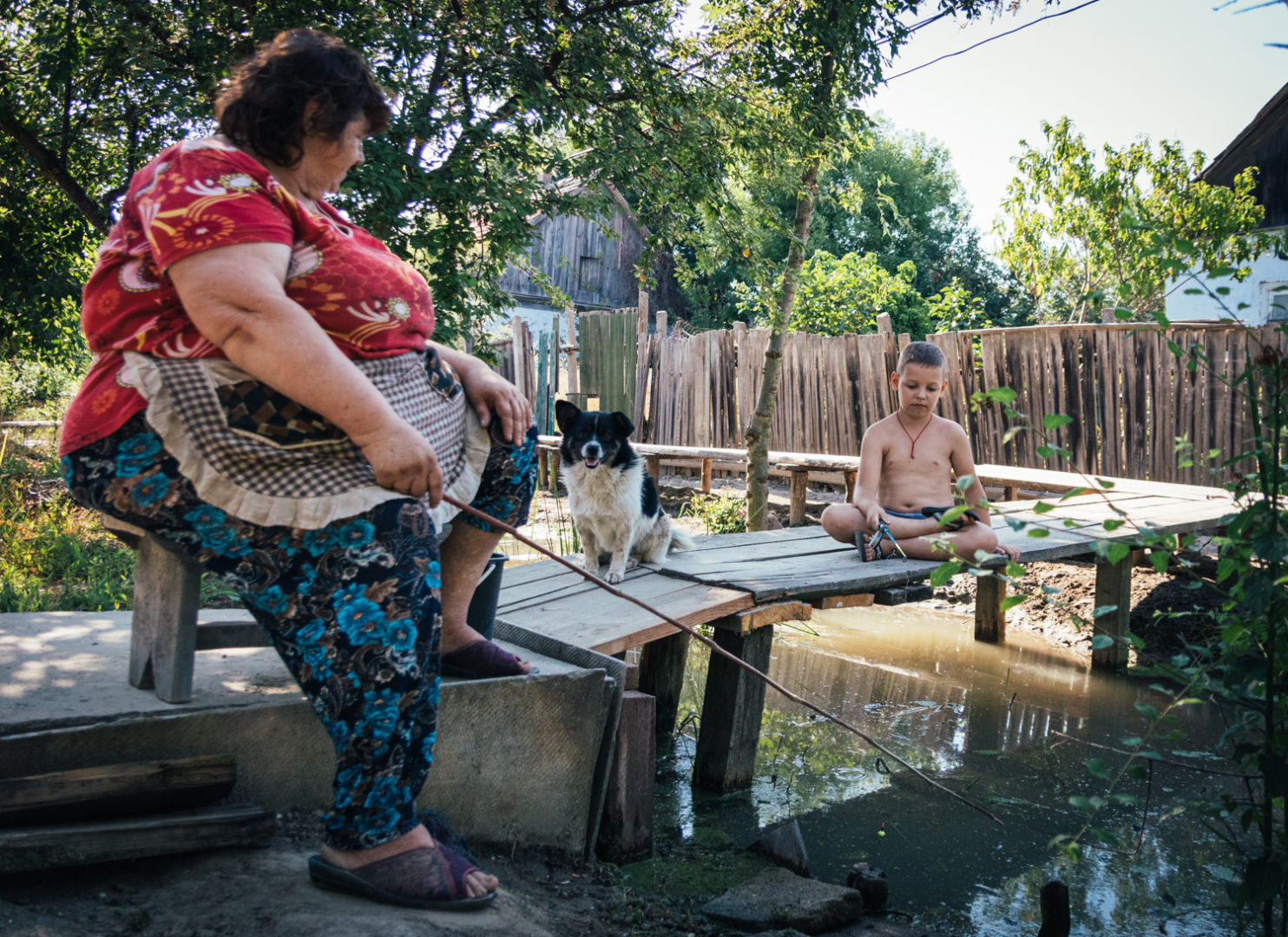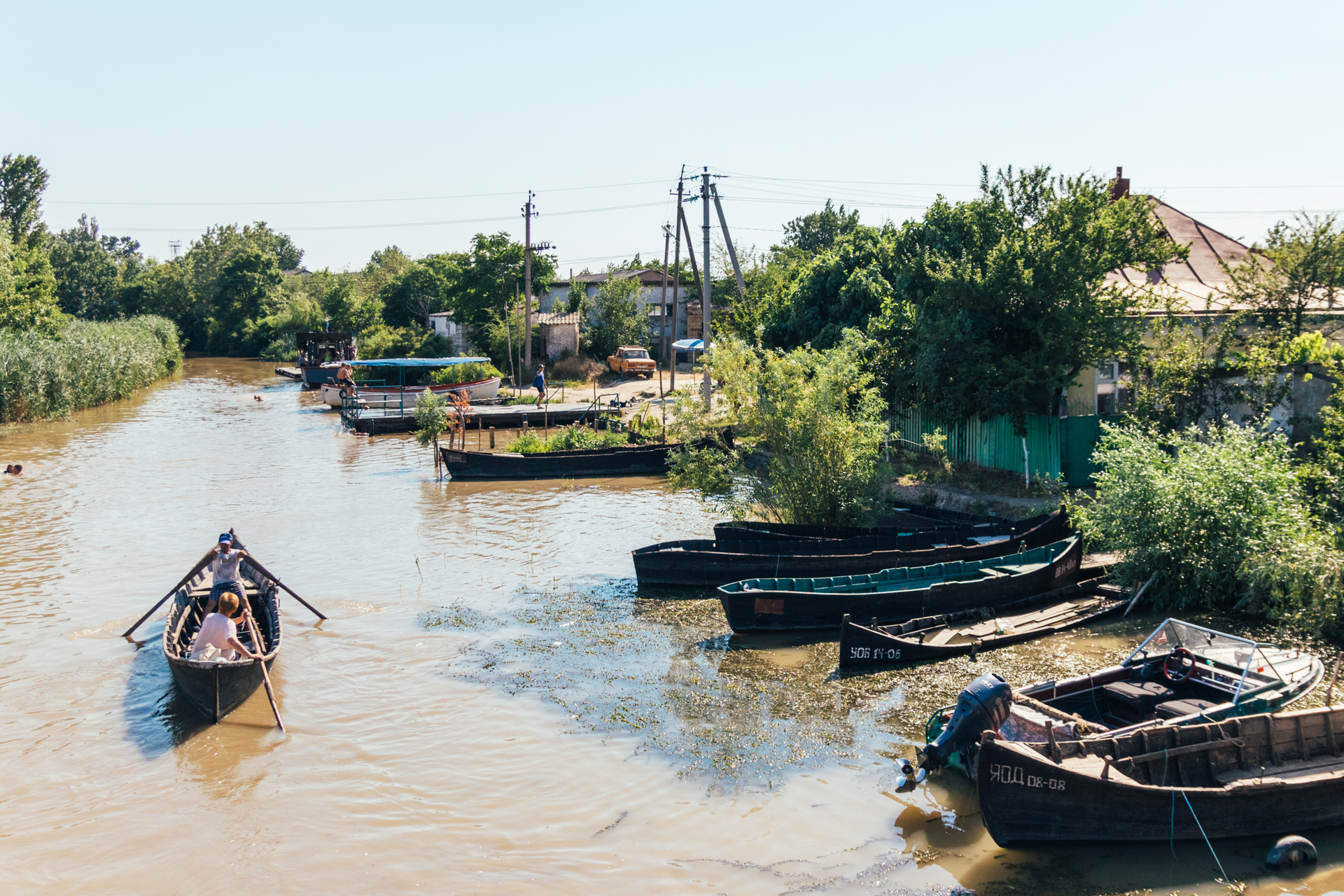
Sturgeon Watchers
Sturgeons appeared on Earth 250 million years ago and as a species outlived the dinosaurs. But meeting a human can be fatal for them: poachers kill them en masse for their black caviar, notochord—a jelly-like analog of a backbone—and meat. Sturgeon are considered a group of species that are disappearing from our planet the fastest: 23 out of 27 species are on the brink of extinction and the other four are perhaps already extinct. In order to return sturgeon to the Danube, Bulgarian scientists annually release thousands of fry into the river. Ukrainian volunteers from the World Wildlife Fund gather in the Danube delta to stop fishing while the little sturgeons make their way to the sea. We report from Vylkove what becomes of it.
“Ukrainian Venice”
The sun is scorching. My bucket hat’s no good. I squint my eyes, making a face like I’ve just eaten a lemon. There’s no wind. The boat has stalled on our way to Vylkove and it is now barely drifting between the reed beds. It begins to stink of diesel.
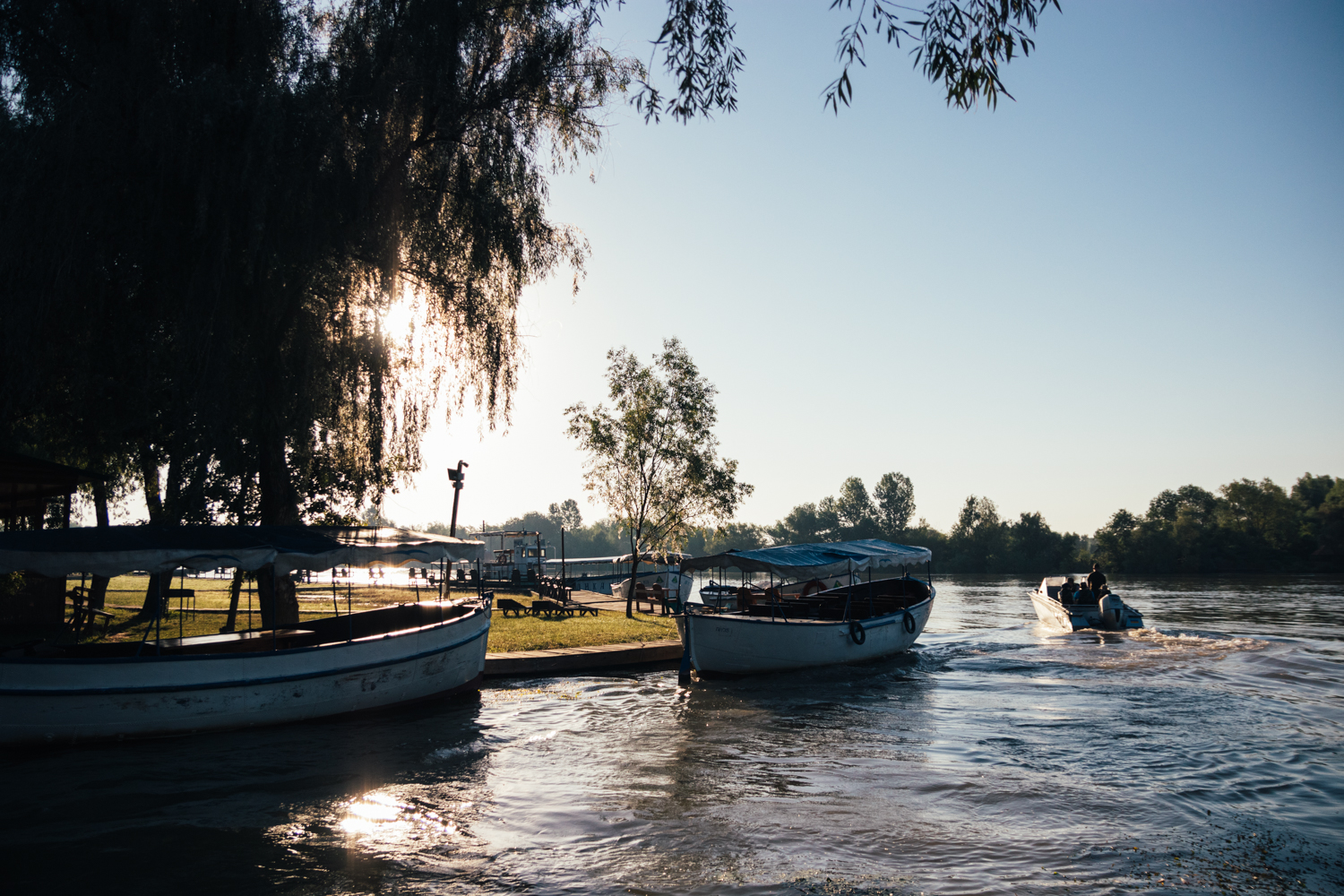
“It’s because there are women on board,” Vasia, a stocky biologist jokes. Besides him, no one laughs. There are three women on board.
The engine grumbles like an empty stomach.
“It’s the first time this has happened. Maybe it overheated,” the “captain” makes excuses while fiddling with the machine.
Eventually the grumbling of the engine grows into the humming that everyone has gotten used to in a week. It’s half an hour at a slow pace to Vylkove. Vasia makes no more jokes along the way.
The water overboard looks like mashed sesame halva: the Danube is the most silted full-flowing river in Europe. Washing reed beds and islands overgrown with swamp willow, it enters the eriks between the streets where the water slows down and becomes greenish. Here and there, rotten wooden footbridges on long piles stick up in the eriks, squeezed between dikes.
We know the eriks and the dikes as “canals” and “dry land.” Residents of Vylkove say that along with the footbridges, these landmarks distinguish them from the rest—Vylkove is often called the “Ukrainian Venice.” In the heat, one can unerringly tell its riverside location by the scent of stagnant water and rotten fish. The town is criss-crossed by 46 kilometers of canals that are gradually being filled in—locals are buying cars instead of dirty, unwieldy boats.
Yet the canals are not the only thing that Vylkove can brag about. For two centuries it has been home to the largest sturgeon fishing community in Ukraine. In 2000, all six local sturgeon species were entered into Ukraine’s Red Book, marking them as endangered. So the industry that has been a part of the traditional way of Vylkove life for centuries, is today forbidden.
Vylkove’s Black Market
In old documentaries you can see that Vylkove had an abundance of sturgeon: smiling women at the market use tablespoons to smear mounds of black caviar on rye bread. Fishermen sail right up to the trading stalls unloading multimeter sturgeons. Men with thick Akhan trammel nets and hooks stand proudly next to gigantic belugas.
Today, saleswomen and the ocassional salesman trade behind the market gate in the town center. All the commerce in booths resembling tight closets seethes around fish—the heart of local business. One can smell the scent of fish from afar, fresh, dry and smoked, blocking the odor of apricots and pot herbs. Just get closer, and the women will stop flapping flies away, turn on their throat bullhorns and try to outdo each other luring you into buying some roach, catfish, plaice, silver carp, herring, carp. Smoked, jerked, fresh, dried, whole and in pieces. C’mon, taste the fish, girls! All fresh and home-made.
For cover-up, we buy some dried fish, and approach tanned, nimble Auntie Nadia—the first booth on the left from the middle. The locals say that she always has sturgeon. The woman business-like wipes her hands on her blue apron and tells us about her wealth of fish.
“Oh what big fish!” I praise her and, mentally crossing my fingers, ask, “Do you have sturgeon?”
The saleswoman cautiously looks around, and then conspiratorially invites us with a nod behind the counter. She snatches up a blue plaid bag from beneath it and pulls out a sturgeon, fresh, rosy, with sleek, wet sides
I notice a plastic box between some silver carp. Auntie Nadia opens it and smiles triumphantly.
“Of course!” she gets out a smoked sturgeon. She holds out her hand and the sturgeon hangs down, showing off its big-scaled ruddy sides. “Five hundred hryvnias per kilo. The caviar is six hundred dollars a liter. Everything is local, from Vylkove. The fisherman bring it on the reg.”
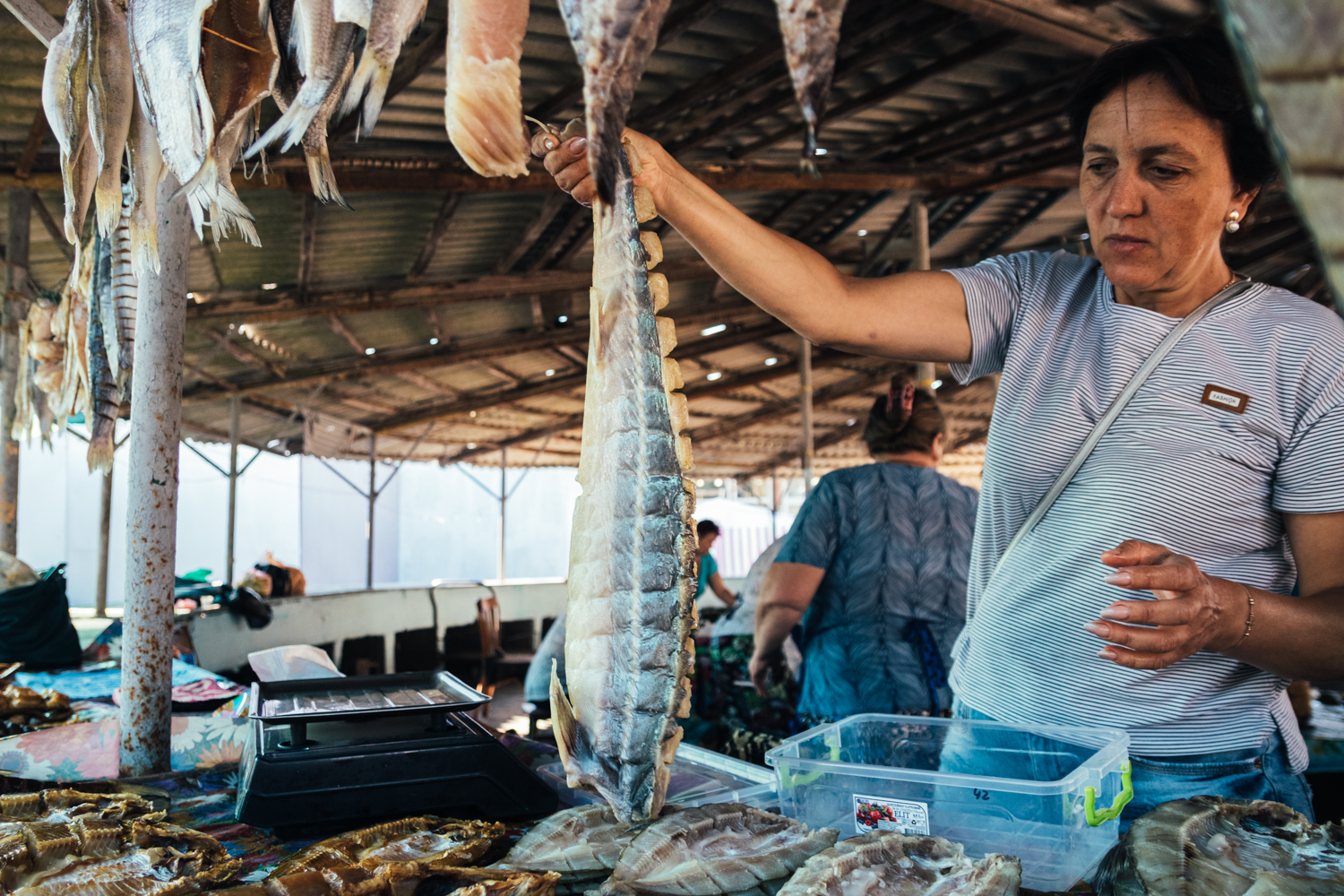
“Do you have any live ones?”
Our attention is no longer warming Auntie Nadia, so we assure her we’ll be buying. But tomorrow. The saleswoman cautiously looks around, and then conspiratorially invites us with a nod behind the counter. She snatches up a blue plaid bag from beneath it and pulls out a sturgeon, fresh, rosy, with sleek, wet sides.
“No pictures!” she scowls, and the fish quickly disappears into her bag. There is no trace of her earlier friendliness. “This is a forbidden fish!”
“It’s forbidden to catch them! What, did you not know?!” her neighbors chime in.
We take our dried fish and make haste out of the market. The very next day the fish inspector will proudly say that not a single sturgeon has been caught in Vylkove in the last year. There are no poachers.
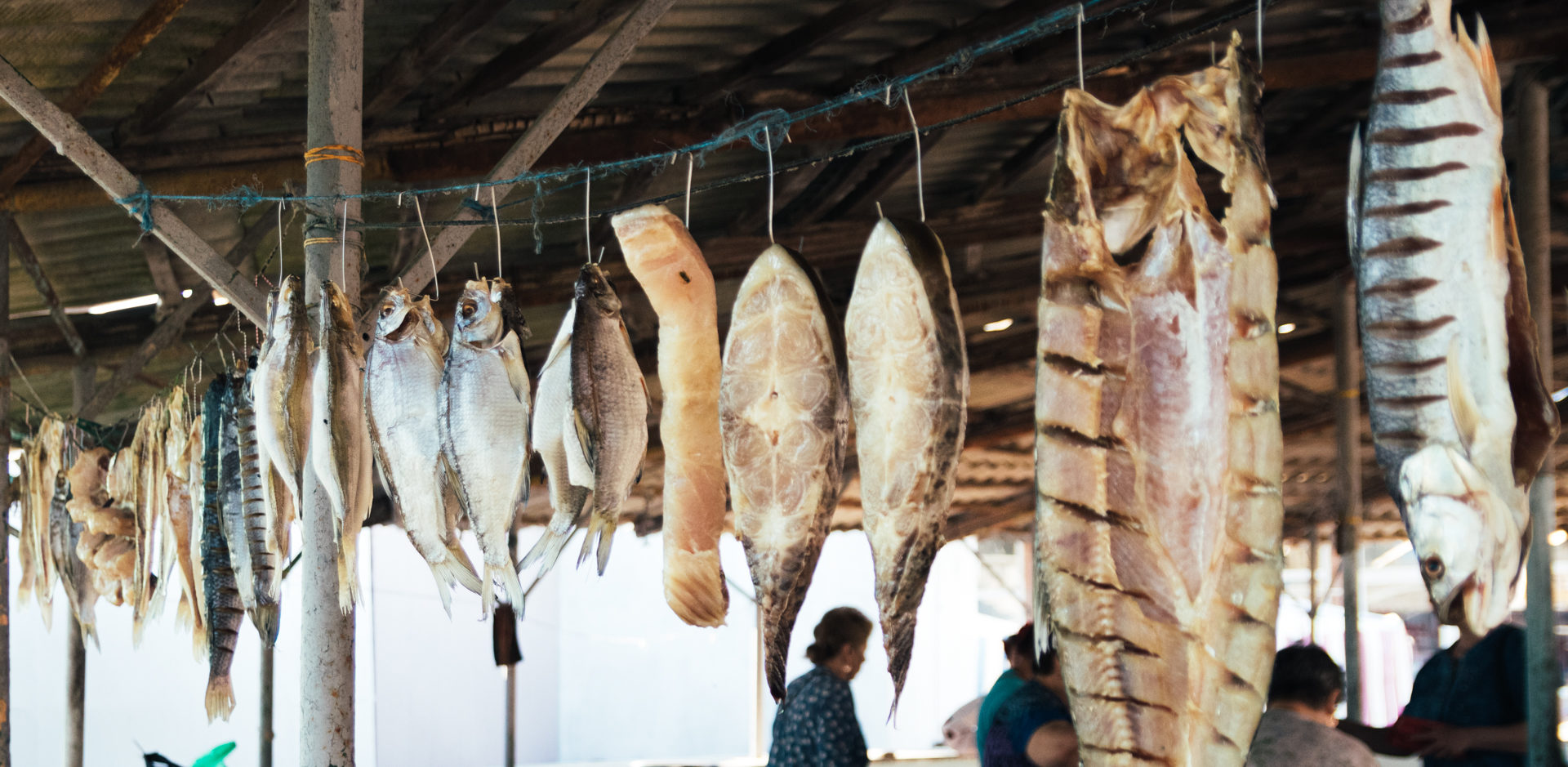
Fish Rots from the Head
Night falls. Moths and midges swarm around the lantern and the croaking of frogs can be heard all around. Beyond the wall of blackness, we can’t even see the reed beds, much less the fishing huts on the islands. The local fishers move there, when herring school the Danube’s estuary. They will spend the next month amid the nets and reed beds with shaky footbridges. They will live in these huts in groups of four or more—it’s a sort of fishing dorm, makeshift and full of junk.
None of the volunteers can be bothered with the reed beds now. From the building where the guards live, we can hear: “I aaaaasked him to be let in, but he diiiiidn’t let me in.” The scientist Kostiantyn Balatsky, short-spoken already, shuts up, perks his ears, smiles at the familiar melody and then slowly resumes his story about the local fishers.
“A true fisherman would never keep a sturgeon that weighs less than ten kilograms—that would be considered truly shameful. But now the work-hands from the town and nearby villages even take the fry. Nothing is sacred for these folk. True fishermen are going extinct.”
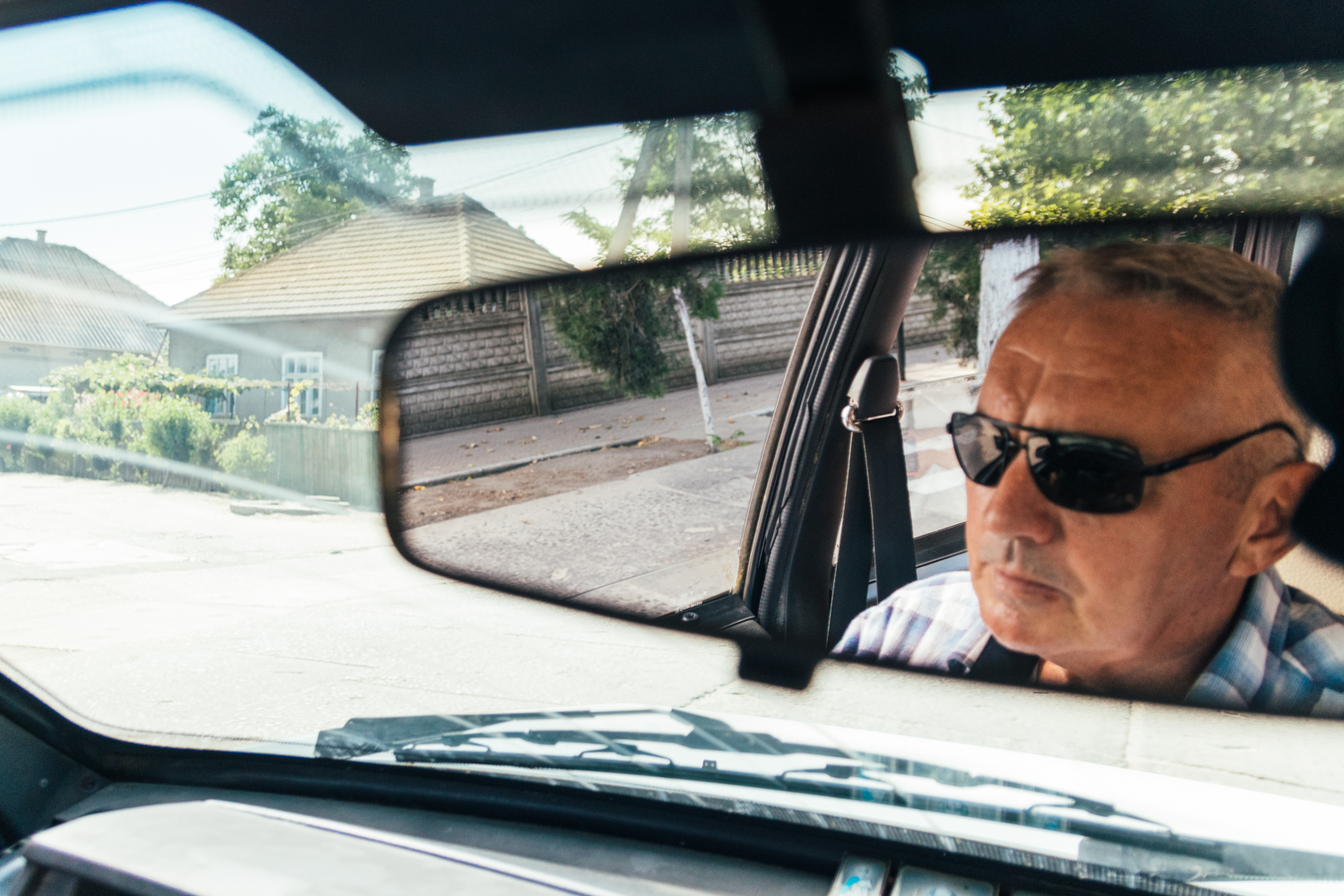
Mr. Kostiantyn doesn’t chatter. He has lived in Vylkove for thirty years. Like most workers at the Danube Biosphere Reserve, he came here for an internship and didn’t want to return to Odesa. With the arrival of the WWF in the town, he was given additional responsibilities. Now Balatsky is called the “sturgeon lawyer.”
He doesn’t look like a local fisherman. His hands are not covered in cuts from the nets, his face isn’t windburnt, his clothes are clean. But he’s the one they share their professional secrets with. Outsiders don’t get past the doorway, but he has managed to get along with them so well, that now he sails from hut to hut every week. At a shared meal, and sometimes even a glass, they talk about the catches, profits, and bribes. But the “sturgeon lawyer’s” main goal is to remind them that it is forbidden to catch sturgeon.
A true fisherman would never keep a sturgeon that weighs less than ten kilograms—that would be considered truly shameful
Such informal agreements are practically the only way to influence the fishers. Some say the fish inspection and guard are covering up poaching. Two years ago, Balatsky found Vylkove sturgeons with Romanian chips at the Pryvoz Market in Odesa. There’s nothing you can do about this: the markets and shops are inspected by the State Service on Food Safety and Consumer Protection, and by the time their officers respond to the call, the sturgeon will have been eaten.
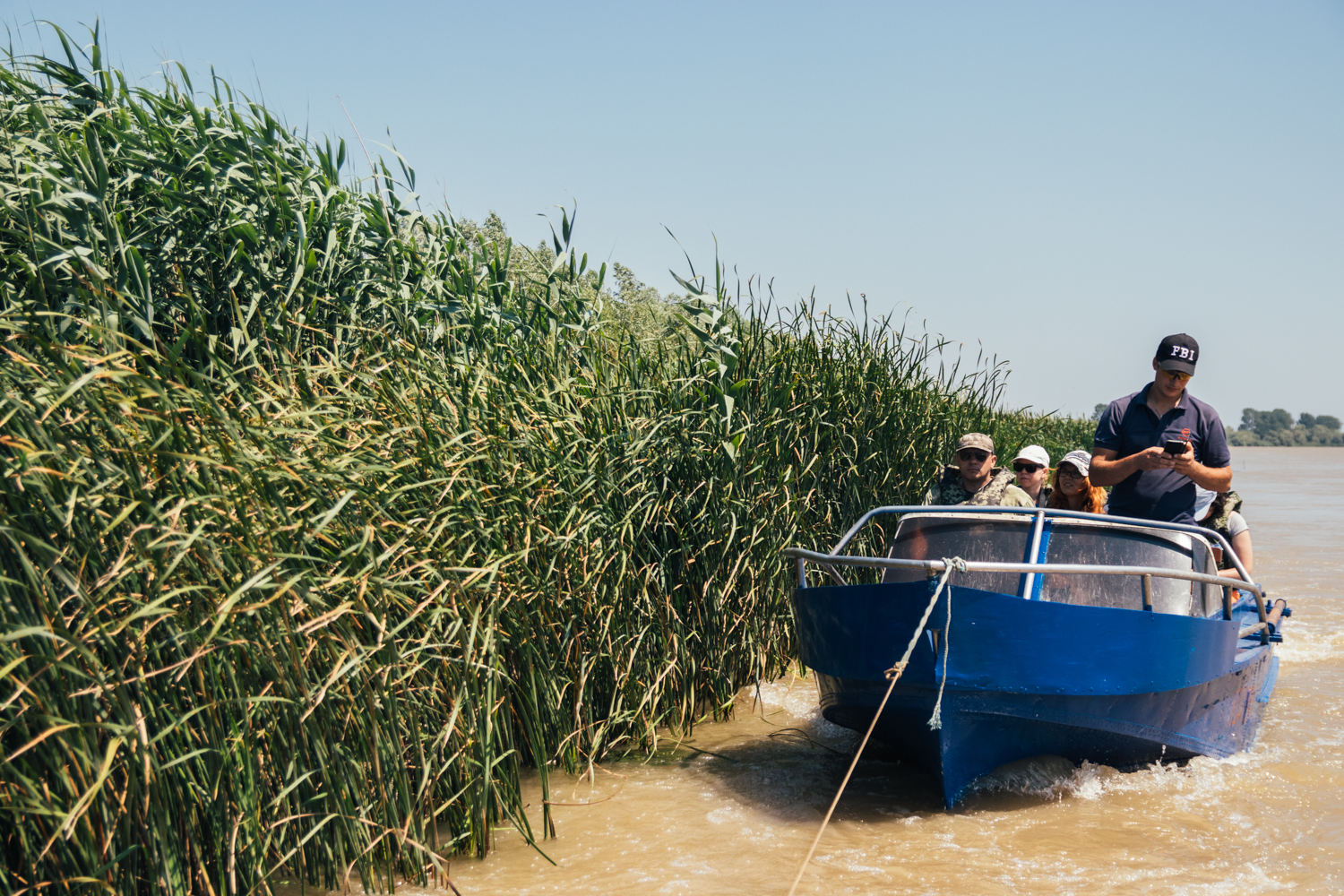
Every year Balatsky observes how not only fish, but also all kinds of inspectors flock to Vylkove at the start of the season. Businesses pay the inspectors to turn a blind eye to the violations. But people who are caught red-handed fishing for sturgeon still go unpunished—their cases “disappear” in the halls of justice. The law says the fine for catching sturgeon can be up to 110,000 hryvnias, but the violators are actually fined just a few hundred. That is if they’re not let off with a “strict warning.”
“You can’t change the system. The locals know who sells what,” the man hopelessly sighs.
The fishers sincerely assure him that they themselves aren’t keen on catching young sturgeons—baby beluga and sturgeon aren’t good for anything, while untangling them from the nets is one big headache. But when it comes to big fish with valuable meat and expensive caviar, they get quiet.
“I once asked if they were catching sturgeon and they fell silent, bowed their heads, and said, ‘Kostia, we’ve known you for years. We can’t lie to you, but we can’t tell you the truth either!’” he recalls laughing bitterly. He adds, sadly shaking his head, “They understand it all perfectly. But this doesn’t mean they’re doing what they should.”
The power of habit and the desire for profit are stronger here than the letter of the law.
On Guard for the Water Calm
The place where the Danube flows into the Black Sea can be seen from far away. The fresh waters and those of the Black Sea seem to be poured into different vessels. If you silence the boat’s motor, you can hear the Danube rhythmically and softly splashing on one side and the foamy sea gutturally humming on the other. On the narrow spit of shore are cormorants, seagulls, pelicans; from the reed beds we can hear hissing, chirping, grunting, warbling and piping.
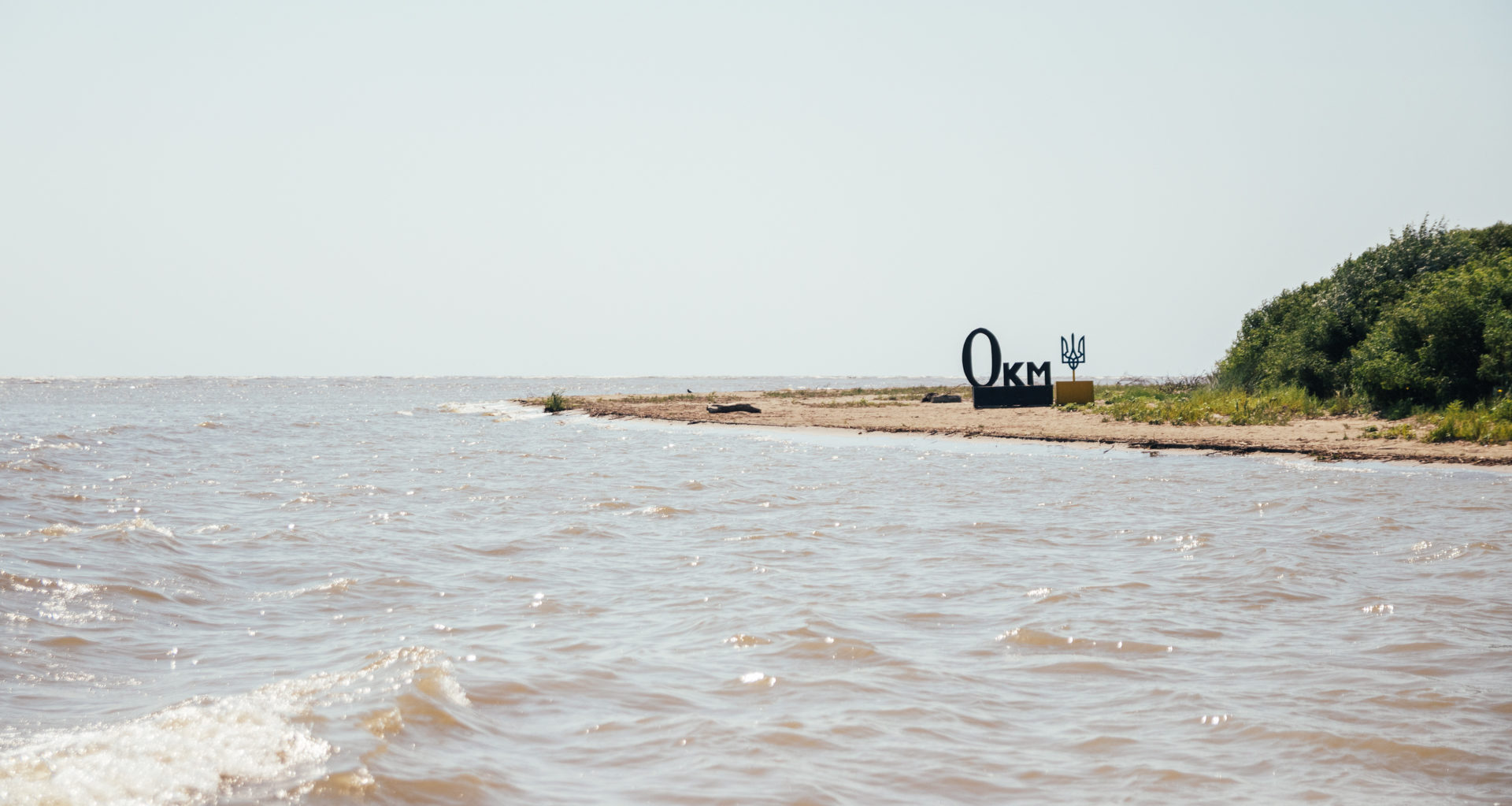
The border guard at the helm of the boat is broad-shouldered and tan. He scenically turns his face to the wind. His conversation with Inna Hoch, an ichthyologist from the WWF, resembles the collision of the Danube with the sea.
“Nah, what difference does it make if the sturgeon are raised on a farm and killed or caught and killed? They still get eaten. And the caviar is tasty,” the border guard thinks out loud. “My grandpa, a Lipovan, used to catch sturgeon. We always had a small bucket of caviar at home in the kitchen near the bench. You could eat it with a spoon. Why protect them? There’s enough for everyone.”
“Actually, the caviar’s just okay,” Inna politely smiles, but is clearly irritated—she’s never heard the like from law enforcement.
The man hits the gas and the boat crosses the line of the sea and jumps up on wave after wave. Shouting over the humming of the motor, Inna starts to explain the danger of sturgeon population decline, but her words fly past the guard’s ears. And it’s not because of the sea wind.
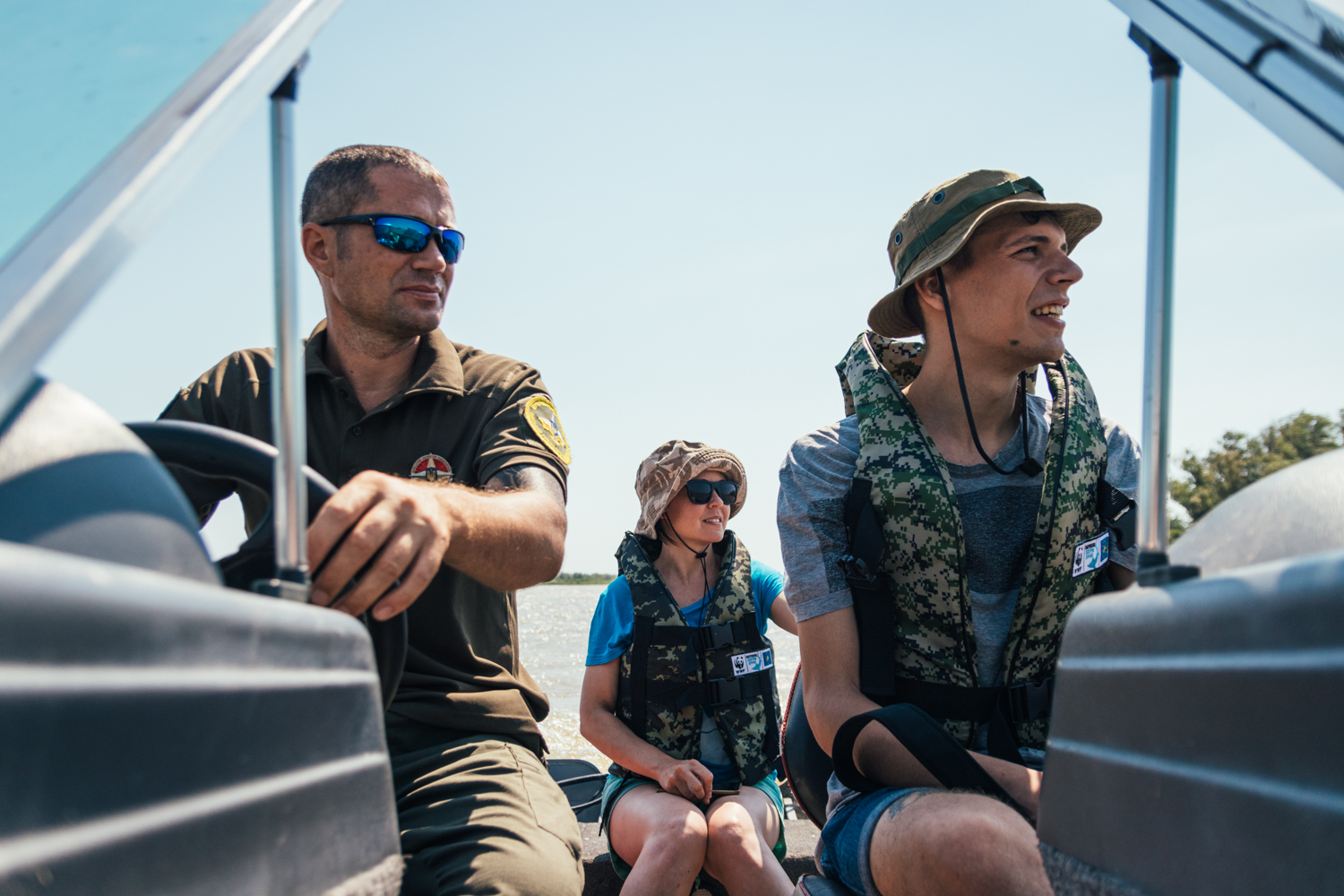
In truth, he was speaking the old Vylkove lifeway, according to which nature unconditionally belongs to the locals. Never mind they are no longer fishermen like their grandfathers and great-grandfathers and have traded the oar and net for migrant wages in Europe or growing reeds, the residents of Vylkove still “accept the gifts of the Danube.” All the more so since the state doesn’t care much about environmentalists.
“They don’t have boats and weapons like their Romanian colleagues, and their salary is 6 thousand (hryvnias, about $250 a month — R.),” Inna explains at dinner that night. Before she started working at the WWF, she was an ichthyologist for ten years at the fish inspection in the Ternopil region, so she knows firsthand about the system’s inefficiency and corruption. “But the problem is that finding people who are excited to do their work is like finding diamonds.”
My grandpa, a Lipovan, used to catch sturgeon. We always had a small bucket of caviar at home in the kitchen near the bench. You could eat it with a spoon. Why protect them? There’s enough for everyone
Going to the sea with the gourmand border guard is one of Sturgeon Watchers’ patrols. This is part of the international project LIFE for Danube Sturgeons. It’s not up to the watchers to detain the poachers, just observe that law enforcement agencies do check the fishers. Another of Sturgeon Watchers’ tasks is to, along with scientists, spot the moment when the agile and slippery sturgeon youngsters enter the delta so they can stop all fishing.
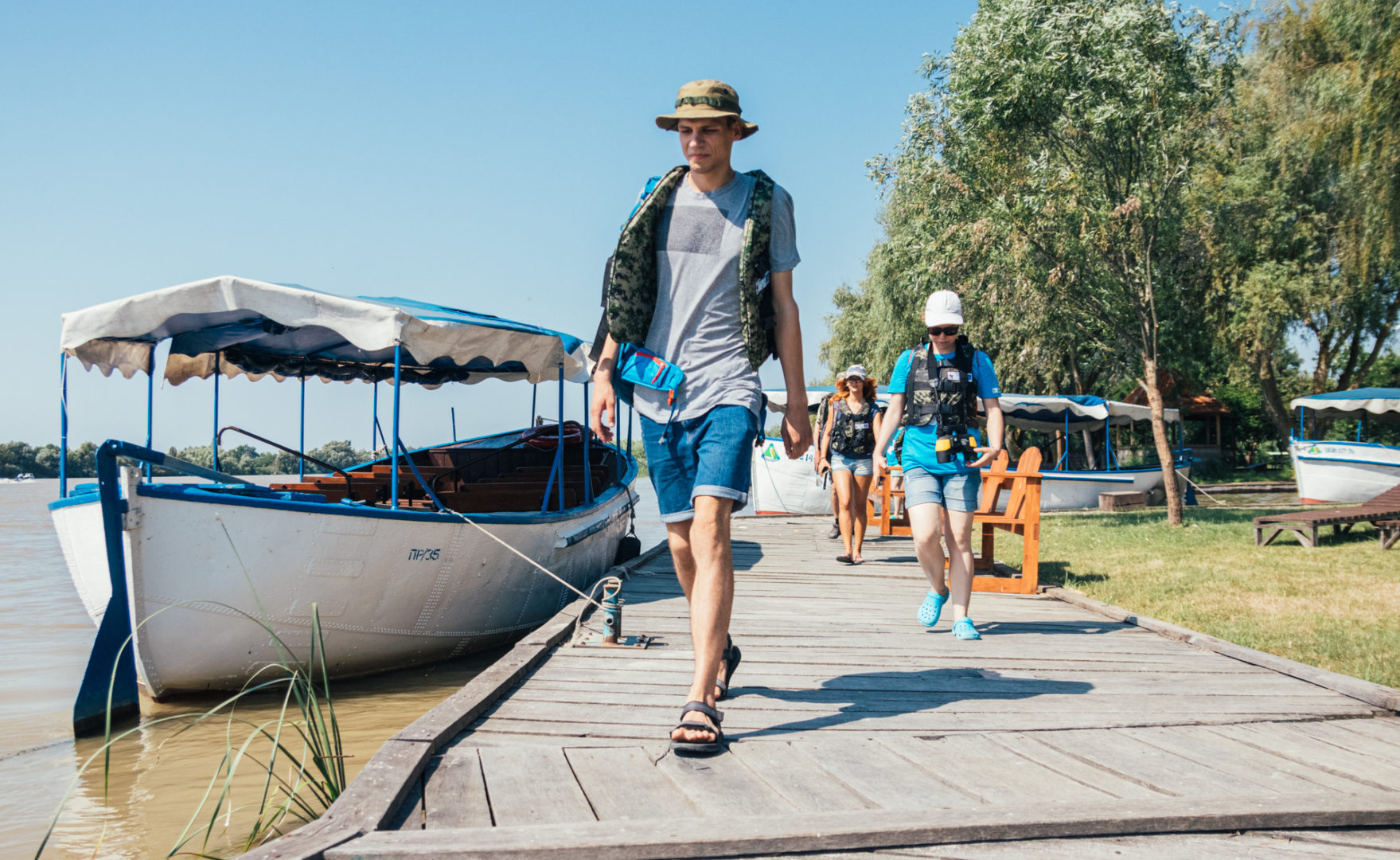
During the first watch, none of the locals yet understood why these weirdos in matching t-shirts had come. But thanks to their observations, scientists discovered that the fry were getting caught in nets along with the herring so they temporarily stopped all fishing. After the visit, the fishery businesses of Vylkove turned in their colleague who had been catching sturgeons and selling them at the market in Odesa to the fish inspectors.
Today Inna can be proud of the changes to the law: for example, thanks to her and the volunteers, nets that scrape the bottom of the river leaving fish no chance of getting past Vylkove have been banned.
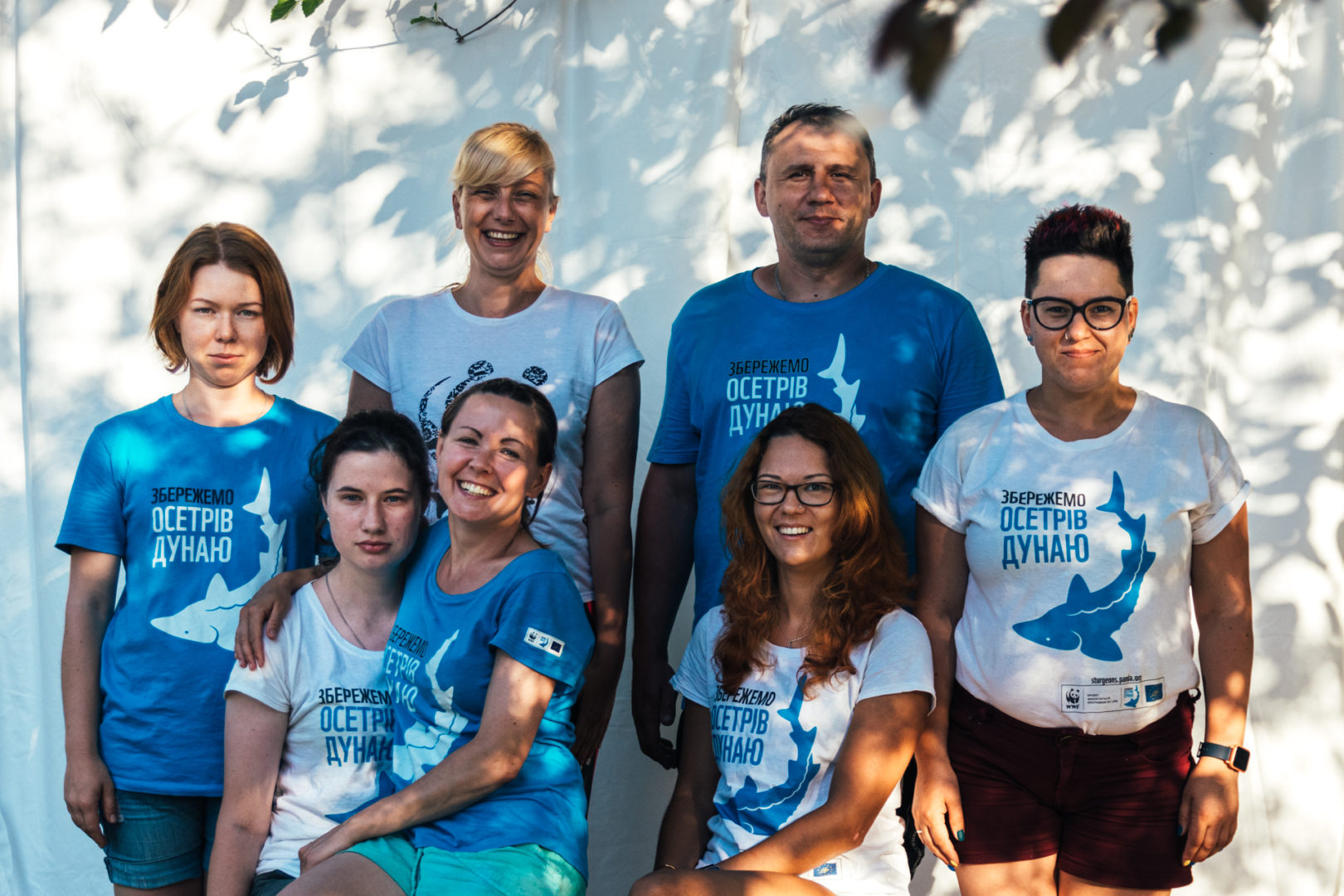
Double Catch
The clock says 6:30. Dead calm. The nighttime freshness of the river is still coming off the Danube. The chained up boats stand still in front of the dock like sleeping horses. The sun has risen above the reed beds, and an occasional bird flutters out of there.
A vest, a bucket hat, binoculars, thick layer of sunscreen, and a camera—the must-have set for a successful morning. The boat cuts through the viscous syrup of the water and gains speed until it stands on end. Today is patrol day.
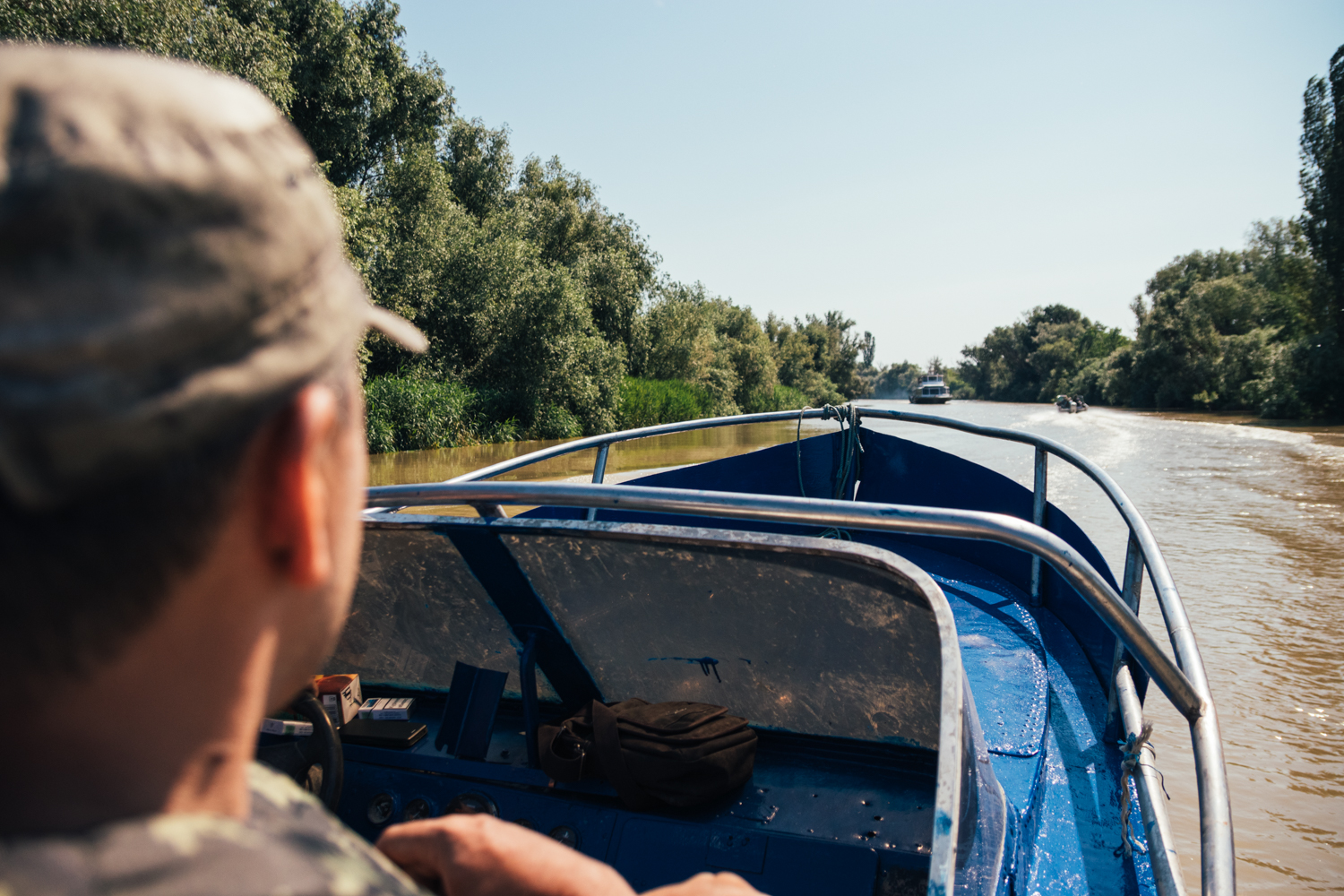
The fishermen’s boats smoothly pass us on the way to their fishing places. Each camouflage cap, each bucket hat or ball cap turns in the direction of the patrol boat, watching it go. The “outsiders” have arrived.
Finally Cap sets about helping Hat. They lift the net together and even from a distance one can see the glimmering of the white belly of a starry sturgeon. There’s nothing to do but let it go
Some fishermen have arrived here before dawn, so now they lean overboard and haul in their nets, unloading the catch in their boats.
“Danube Sturgeon Survival Society!” the inspector shouts, drawing level with the fisherman.
“Huh?” a startled man lifts his head, holding his net in his hands. The volunteers squeal with laughter at this introduction.
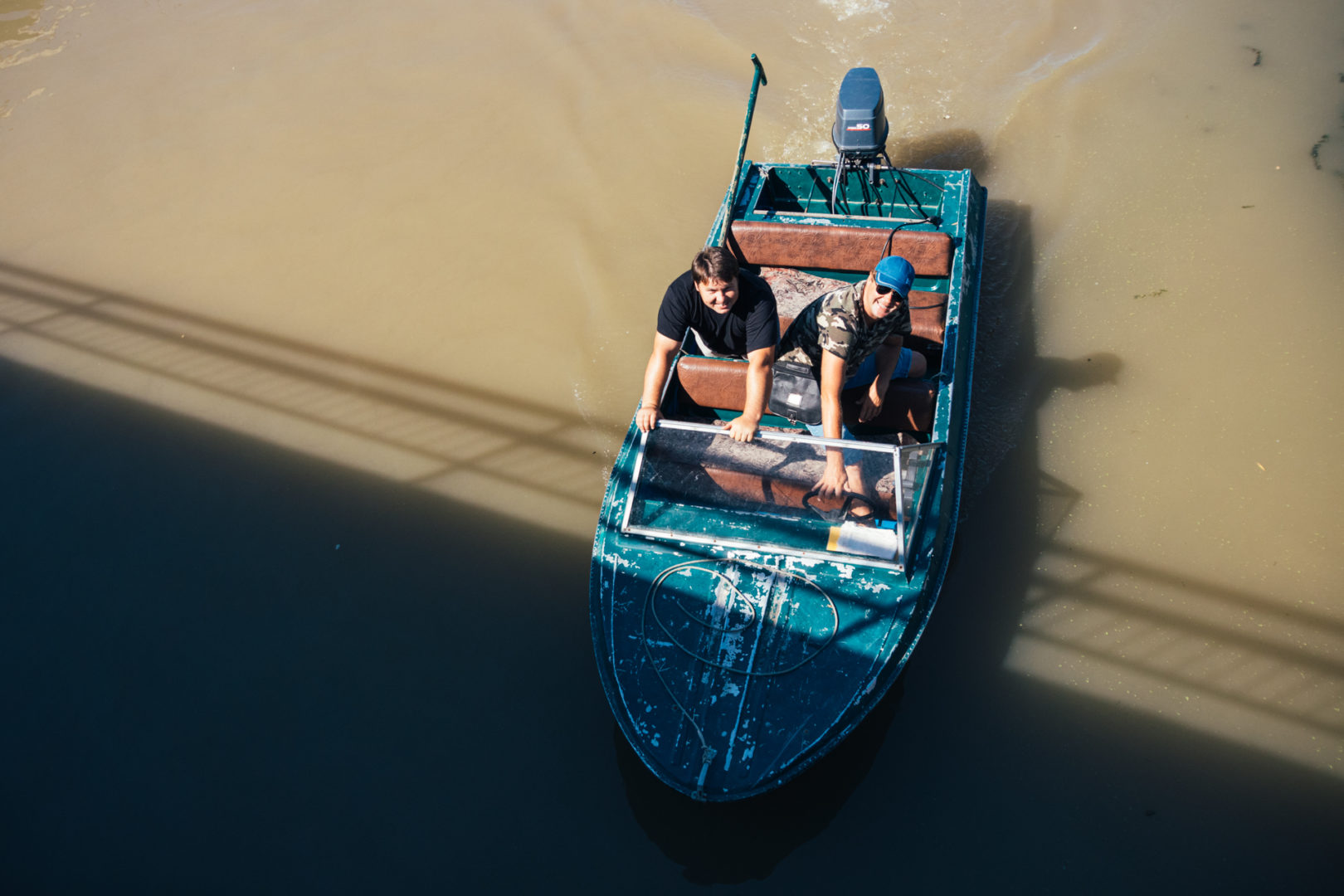
“Danube Sturgeon Survival Society! Please welcome!” the inspector responds with bavura. “What have you got?”
While one of the fishermen dressed all in camouflage looks carefully at the inspector, the other in a hat slowly hauls in the net. From the near shore, another environmentalist is watching them through binoculars. And five volunteers in matching t-shirts and vests stare impatiently, cameras at the ready.
Finally Cap sets about helping Hat. They lift the net together and even from a distance one can see the glimmering of the white belly of a starry sturgeon. There’s nothing to do but let it go.
The boat practically ships water while Hat and Cap struggle with the net. They shake, twist, and untangle it, silently and slowly.
“Grab a knife and make a hole,” the inspector impatiently needles them.
The fishermen have no intention to cut the nets they pay for. Finally they free the starry sturgeon. It is long and thin with a pointed nose; it looks like a ski and it convulsively whips its tail. The patrol moves on.
They don’t catch anyone for the next hour—the nets are full of herring and all sorts of minnow. The sun rises and closer to nine it’s quite scorching. The boat turns around among the reed beds and passes the same gulfs, bayous and islands on the way back. The fisherman show their nets for a second time.
Hat and Cap haven’t gone far from where we left them high and dry. Seeing our boat, they again phlegmatically haul in their nets—and again the white belly of a starry sturgeon glimmers.
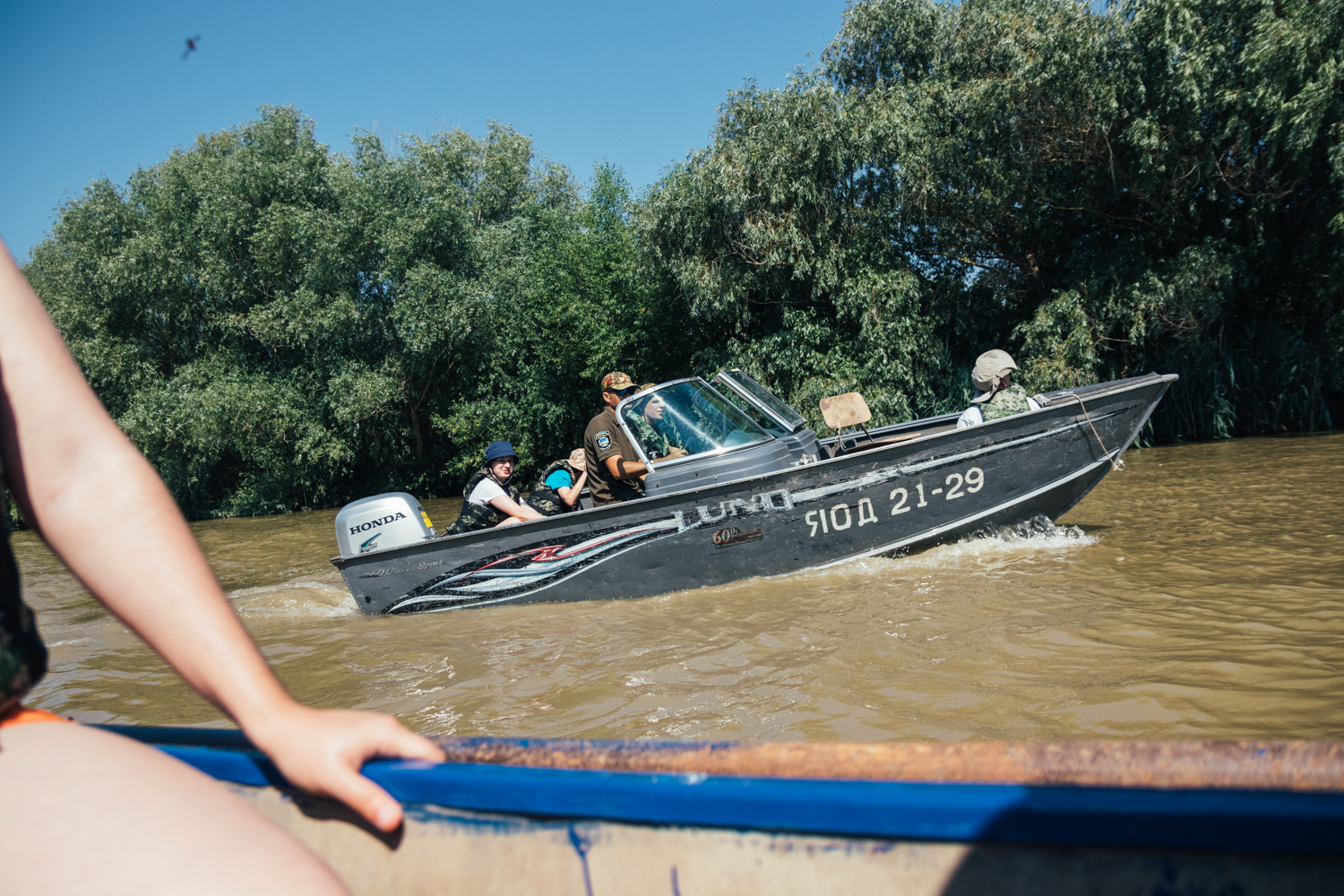
The Sturgeon Watchers are triumphant and the inspector feels like a genuine river sheriff while the fishermen exchange dejected glances. They don’t argue, but they slowly repeat the same procedure: shake, untangle the thorns, toss overboard. Fortune is toying with them. In an hour and a half they have released tens of thousands of hryvnias into the water. The Danube gave and the Danube has taken away.
On Nature’s Tow
Thirty years ago, Vylkove was a mirage on the Danube delta with a half legendary fishing past and the largest fish farm in the UkrSSR. People would jump from the shore to have a swim in the main channel that is today as shallow as one meter in some places. The water arteries that used to take them to school, to the market, to church, and carried their newborns and their dead, are gradually disappearing. The Danube Shipping Company that kept the city afloat went into decline and the Black Sea Shipping Company hauled sturgeon away by shiploads in the 90s. Now catching sturgeon is forbidden, their caviar is no longer offered by the local generous market women, and the kids handle smartphones instead of boats. Vylkove, like other cities on the Danube, depends on tourism to survive. Scholar Tetiana Balatska says that everything has changed, just not the people of Vylkove.
“They still have a rather small-town worldview and teaching them to work in tourism is very complicated. The Danube Biosphere Reserve is Vylkove’s ‘locomotive,’ she explains, not without pride in her work. “Last year 20 thousand people traveled its tourist route Kilometer Zero.”
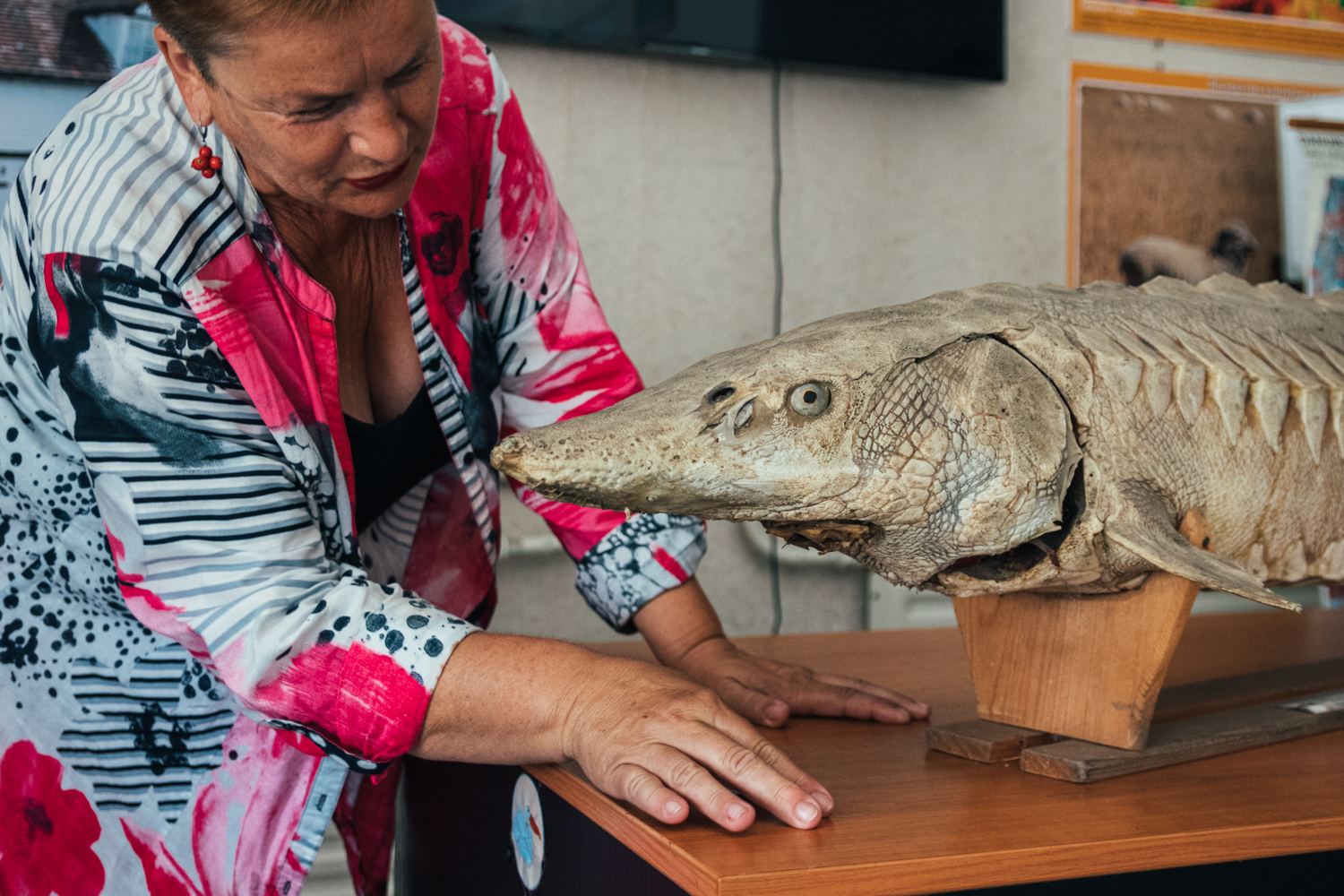
Balatska is in charge of the reserve’s information and tourism center. From the outside it looks no different from all the other homes in Vylkove—it has a green fence, whitewashed walls, flowers, and grapes. Yet on the inside are maps, fishing nets, a maquette of the delta, and a taxidermied sturgeon. Balatska moved to Vylkove over thirty years ago and is still excited to show off the updated maps and tell the story of the town that she left Odesa for.
“The first Old Believer settlers came to the left and right banks of the Danube in 1746. They were fleeing church reforms in tsarist Russia and were ready to burn themselves alive before changing their faith. They brought along their icons painted on linden wood, which is why they’re called Lipovans (from the Russian word for linden, lipa — R.).”
Since then, the delta has taken back 20 kilometers from the sea—the land is washed in by the Danube, which brings silt from Europe. You can literally see how much water has flowed, yet Vylkove is still divided into the unofficial neighborhoods of Lipovans and Khokhols (the word khokhol is an ethnic slur for Ukrainians — R.). From time to time, the locals’ settled way of life and attachment to the town cause them to sacrifice migrant wages in Poland. Conditions in Vylkove aren’t ripe for local business. Balatksa is convinced that the town would flourish if people had opportunities to work. Then they would be better off and needn’t fish for sturgeon.
Now there are 650 fishers, 1000 workers who procure reeds, and 500 sailors in Vylkove. Sailors are the only ones who can live comfortably; the others are living on a shoestring. And hoping to catch a “pointy one” now and again.
The majority of the locals, who descend from both Ukrainians and Lipovans, live in a different world. They are distrustful; they tell “us” from “outsiders.” An “outsider” gets left with nothing. Or rather, with a shell of Vylkove—not tourstic enough, with a rich fishing past, and a present that’s fading away. “Outsiders” will hardly find out that the town of zealous Old Believers worships the water god of the Danube. And that they are ready to destroy him for their love of consumption.
Translated by Ali Kinsella.
[This publication was created with support of the Royal Norwegian Embassy in Ukraine. The views and opinions expressed in this publication are those of the authors and do not necessarily reflect the official position of the Norwegian government].
Have read to the end! What's next?
Next is a small request.
Building media in Ukraine is not an easy task. It requires special experience, knowledge and special resources. Literary reportage is also one of the most expensive genres of journalism. That's why we need your support.
We have no investors or "friendly politicians" - we’ve always been independent. The only dependence we would like to have is dependence on educated and caring readers. We invite you to support us on Patreon, so we could create more valuable things with your help.
Reports130
More





